

























“I love a challenge,” says illustrator Chris King. “In this case, it was finding a reference photo of James Brown looking sad (he seems quite happy, so I had to improvise).” p26

“It’s time that peers like me did our job in the north,” says former Labour transport secretary Lord Adonis. “We’re not going to rebalance our economy until we reduce the dominance of London.” p78

“As the owner of a rather large nose, I take odours very seriously,” points out photographer Seamus Ryan. “The smells I miss the most are my old darkroom, the Atlantic Ocean and the leather seats in my Dad’s old Triumph 2000.” p90
90

Why the right scent can give businesses the sweet smell of success

It would be hard to find two more straightforward “stars” than Timothy Spall and Tanni GreyThompson and we feature both of them in this month’s issue! Each became famous for totally different reasons, but both retain a down-to-earth quality that’s incredibly refreshing in this age of celebrity obsession.
Timothy tells us all about making the new series of Blandings and how much he loves the sea (see p30); while Tanni remembers how her parents encouraged her independent streak and fought to get her into a mainstream secondary school. Read her “I Remember” on p60.
PS: Don’t forget to send in your pictures for our family photo competition (p50). We’ve had some cracking entries so far, so get snapping and join in the fun.





Send us your stories, jokes and letters—if we publish, we pay!
£50 for the star letter and £30 for regular letters.
Email readersletters@readersdigest.co.uk or go to readersdigest.co.uk/contact-us
£50!


£50 for the true stories, anecdotes, jokes in Laugh! and You Couldn’t Make It Up…, and contributions to end-ofarticle fillers, Travel and Gardening.
Email excerpts@readersdigest.co.uk or go to readersdigest.co.uk/contact-us
Visit readersdigest.co.uk or write to Reader’s Digest, PO Box 444, Douglas, Isle of Man IM99 3ZF. UK: £45.48 a year. Republic of Ireland: €61.20 a year. Europe: £50 a year. Rest of the world: £60 a year. Prices include delivery. For Gift Subscriptions contact Customer Services below
cuStomer ServiceS talking magazineS
Contact Customer Services for renewals, gifts, address changes, payments, account information and all other enquiries. Phone: 0871 351 1000 (Calls from a BT landline will cost 10p a minute. Call costs from other providers may vary.) Email: customer_ service@readersdigest.co.uk
Minicom: 0870 600 1153.
twitter.com/rdigest
Reader’s Digest is available in a talking edition for blind and partially sighted people for £16. For details, phone: 01435 866 102; email: info@ tnauk.org.uk, website: tnauk.org.uk.
facebook.com/readersdigestuk
Ensure submissions are not previously published. Include your name, email, address and daytime phone number with all correspondence. We may edit letters and use them in all print and electronic media. Contributions used become world copyright of Vivat Direct Ltd (t/a Reader’s Digest).
We cannot acknowledge or return unpublished items or unsolicited article-length manuscripts. Do not send SAEs. Articlelength stories, poetry and cartoons are not requested.
pinterest.com/readersdigestuk



+ Expert health advice
+ Great money-saving tips
+ Hundreds of healthycooking ideas and recipes
+ Easy-to-follow DIY tips
+ Gardening know-how
+ Fun and games, including Beat the Cartoonist and our famous online Word Power Challenge
+ Celebrity interviews
+ Competitions and prizes galore PLUS Register for our special prize draw and sign up to our regular newsletters, and much, much more!



check out our fabulous apps! go to the app store, iTunes music store, google Play store and amazon to download our magazine apps onto your iPad, Kindle or tablet.

“

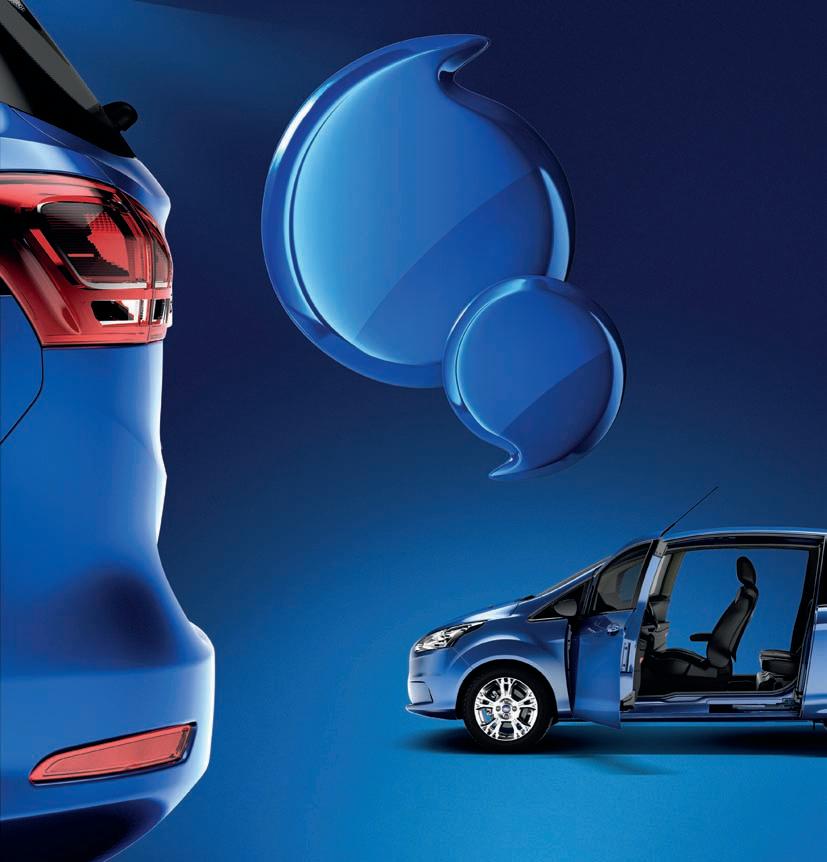




Get your FREE cholesterol lowering* starter kit.
Start lowering your cholesterol today with a FREE kit including a Cholesterol Lowering Guide, pro.activ coupons and much more.

Order yours at f loraproactiv.com/kit while stocks last.






£30 for eacH pubLisHed Letter, £50 for tHe Letter of tHe montH! see p4 for more detaiLs

I disagree with James Walton’s Maverick article
“Your Opinion May Not Be Important to Us”. He seems to have low expectations of the UK population: he thinks we have no ability to formulate and express our beliefs on the many issues that confront us.
But we’re better informed these days than ever before, and our opinions need to be heard. Syria, used by the writer to deride the masses, is a case in point—the prime minister hoped for military action, but I think “Dave from Beckenham” spoke for many when he said we should “stay out of Syria”. Experts frequently make errors, change their minds and disagree with other experts. Left on their own, they would become complacent. They need us, the great British public, to challenge them at all times.
Gillian Keenan, Hertfordshire
I often set unrealistic short-term goals and wear myself out trying to achieve them. But reading “Smash Your Limits” motivated me to start again. Life isn’t always about achieving your goals—it’s also about how you enjoy striving towards them and knowing that you’ve performed to the best of your ability. Thank you for reminding me of this. My goal this year is to complete the refurbishment of a house.
Louise Webber, Lincolnshire
I agree with Giles Andreae’s wish in “If I Ruled the World” to introduce happiness lessons for primary-school children. There’s huge pressure on kids these days, and league tables have a lot to do with this. As a teacher, I’ve forgotten what it’s like to have a good conversation with one of my pupils—it’s all teach, teach, teach, along with endless paperwork.
I’d love to be able to ask one of my pupils, “Did you have a nice weekend?” and be able to listen to and enjoy their response.
Luke Harden, Liverpool

Mistel de Verona @Mistel_dV

I just read a reader’s digest front to back (it was a gift subscription from my husband’s grandma).
Giles Andreae’s plea for the use of plain English was spot on—it made your item on the Gobbledegook Generator (p40) even more apt.
If Giles ever decides to buy an island and create his utopia, I’ll be on the first boat. angela trainor, London
“When Animals Act Like Humans” was very moving. At a family funeral I attended a few weeks ago, the graveyard backed onto a field where some horses were being exercised. During the burial, two of the horses stood looking over the fencing side by side for several minutes, as if paying their respects.
Despite the sad occasion, several mourners commented on it afterwards. One even said she felt strangely comforted by these gentle creatures that took time out of their day to show support.
Gloria Wilding, merseyside
popping your cork
I’d like to add one thing to your excellent “Instant Expert” article on champagne—when opening the bottle it’s always best to have
a flute handy in case there’s an eruption of liquid. But when it’s done correctly, there should only be a slight “pop” and a controlled, steady flow— quite unlike the exuberance of Formula 1 drivers!
catherine Hiscox, Hertfordshire
I’m glad to see your Cornishpasty ingredients in “Best of British” included beef skirt, rather than minced beef. However, the traditional pasty was encased not in rough puff but in tough, lardy pastry—so tough that it could survive being dropped from the top of a mineshaft to the waiting hands of a miner hundreds of feet below!
It’s also claimed that the original pasty was actually a large pilchard, encased whole, with the head and tail sticking out at the ends.
Kirsten coulter, berwick-on-tweed
“If GILes AndreAe buys An IsLAnd
A nd creAtes hIs utopIA, I’LL be on the fIrst boAt”
Having just been teaching my grandson some basic physics, I was taken aback when he pointed out Royston’s cartoon in your January issue (p11), showing a woman in a ducking stool. With a puzzled look, he said, “It would take at least two men to do that, wouldn’t it?”, and I had to agree. You have knowledgeable young readers as well…
mike burrows, Hampshire

































r a d ar your short, sharp guide to march
A frog in his coat: Ricky Gervais as the latest Muppet baddie

 Author and BBC4 Review Show critic Natalie Haynes on the new releases
Author and BBC4 Review Show critic Natalie Haynes on the new releases
in cinemas
Muppets Most Wanted It’s time to play the music. It’s time to light the lights. Yes, it’s time for a new Muppets movie, and in this one they’re mixed up in a crime caper while in the midst of a European tour. Not that it matters, because the joy of the Muppets is not usually to be found in the plots, but in the interplay between human and puppet. And the humans are a good bunch this time—the glorious Tina Fey from 30 Rock and Ty Burrell of Family for a start, not to mention Ricky Gervais. And the list of guest stars is as long as this page, from Lady Gaga to Frank Langella, via Christoph Waltz and Ray Liotta.
On top of that, the songs are written by Bret McKenzie from Flight of the Conchords, who won an Oscar for the excellent “Man or Muppet” in the last film. Time to practise those puppeteering skills.

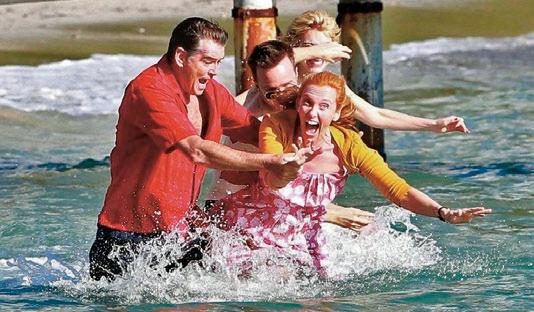
Making a splash: the stars of A Long Way Down
Down A close adaptation of Nick Hornby’s 2005 novel, this dark comedy opens with four strangers on the roof of a building on New Year’s Eve. All of them have decided to commit suicide, but they now form an unlikely bond, and we follow each of them as we discover what pushed them to the brink— and what might save them.
Pierce Brosnan plays Martin, a disgraced TV presenter, with easy charm, while Aaron Paul also convinces as JJ, the pizzadelivery man with a secret. Toni Collette is excellent as the dowdy Maureen, sole carer of a disabled son. And a sparklingly bonkers Imogen Poots is the troubled daughter of an MP.
The film’s tone flits between comedy and tragedy with few missteps. And, as it should, it leaves you glad to be alive.

reader radar
Sally Halper, 42, content manager


Watching: Benidorm (ITV) It’s pure escapism from Britain’s wet weather. Plus, it makes me laugh.
Reading: NW by Zadie Smith
The novel follows the lives of four Londoners and made me see an area of the city I know quite well in a different light.
Online: bl.uk The British Library’s
Gravity The super-tense space-fest—starring an Oscar-nominated Sandra Bullock—can now stress you out in your own home. Magnificent.
Escape Plan Schwarzenegger and Stallone look like they had a lot of fun making this. Stallone plays a prison-security expert jailed for a crime he didn’t commit. He’ll need one man’s help…
website. Not just because I work there, but because from digitised old newspapers to wildlife recordings, it has something for everyone.
Listening: The Next Day by David Bowie I’m a lifelong fan, but this album is right up-to-date, with some lovely ballads mixed in with concept pieces and pop.



BBC6
Music’s Stuart
Maconie’s pick of the recent releases
After the Disco by Broken Bells
Think Howard Jones for hipsters
The second album by Broken Bells—an icily cool duo comprising The Shins’ James Mercer and the ubiquitous Danger Mouse—has a perfect title for the mood of weary, lovelorn comedown that this collection of songs is imbued with. Forget the heavy Bee Gees stylings of single “Holding On for Life”, the ghost

Absurdly lavish: the Small Faces box set
of 1980s trembling-lip popsters à la Nik Kershaw walks these slick retro grooves.
Total Strife
Forever by East
India Youth
Think James Blake meets Philip Glass

Winsome young men making melancholy electronica is very much the current thing, but William Doyle brings a genuinely shadowy experimental edge to the party. Having been a fairly conventional indie frontman in Doyle & the Fourfathers, as East India Youth he has turned his considerable talents to making grainy abstract music equidistant from Radios 1 and 3.
Here Come the Nice by Small Faces
Think pop goes Time Team
As the traditional business structures of the music industry crumble—with today’s kids no more likely to spend money on a physical music artefact than they are to buy an ear trumpet—so the biz has to add value to lure the affluent middle-aged consumer to the tills.
This almost absurdly lavish box set takes this to new heights— one brief but glorious period (1967–69) in the history of the much-loved mods explored via set lists, ticket stubs, lyric sheets and, yes, the songs: nuggets of Mockerney psychedelia from a golden age of UK pop.

Technology expert, LBC presenter and Answer Me This! podcaster
Olly Mann reveals the latest must-haves
also on our radar…
March 2
The Academy Awards, Los Angeles
March 6–9
Crufts, NEC Birmingham
March 6
World Book Day
March 20
International Day of Happiness
March 21–23
Sport Relief
March 30
Mother’s Day
The not-yet-on-sale highlights from the Consumer Electronics Show in Las Vegas—the world’s biggest exhibition of new gadgets
Samsung Bendable TV 3D TVs flopped, so firms are now cranking out curved screens—promising a more “immersive” experience. The problems are that you can’t hang them on the wall, and you need to be sitting in the middle to see the full benefit. But this 85-incher allows you to switch between a flat or curved screen at the touch of a button.
Intel Edison
Remember when PCs and phones got smaller each year? Then “phablets” came along and, with them, the current vogue for ever-larger displays. But computers continue


to shrink and this one is the size of an SD card. It means that in the future we’ll have “smart” trainers, tops and jewellery that don’t need to hook up to a phone to look for a Wi-Fi connection or store data.
Sony 4K Handycam You may already have a 4K TV, which displays four times the resolution of HD—but there’s hardly any 4K content actually to watch yet. So why not shoot your own? The most compact 4K camera yet, this is as accessible as you’d expect from a Handycam, and it could cost less than £2,000.

Oculus Rift Crystal Cove The internet’s been geeking off about these virtual-reality headsets for two years now. We still don’t know when they’ll be available, but we do know they’ll have head tracking that allows you to lean into gaming environments; not just look left, right, up and down.



ESPNcricinfo cricket blogger, broadcaster and stand-up comedian Andy Zaltzman previews the best of the month’s action
England v Wales, Six Nations, Twickenham, March 9 After this match, the next time England and Wales meet at Twickenham will be in next year’s World Cup. An idiotically early draw almost three years before the tournament has left the two teams in the same group as Australia—three of the world’s current top six. “Why was the draw for a tournament in autumn 2015 made in December 2012?” you may well ask. Answer: no reason. No reason at all. Apart from rubbish reasons, probably with a £ or $ sign involved.
England will seek to avenge their comprehensive clonking in last year’s title-decider in Cardiff, when they were not merely taken to the cleaners, but put on an uncomfortably hot wash, shrunk, and given to a charity shop.

Winter Paralympics, Sochi, March 7–16
Visually impaired skier
Kelly Gallagher aims (left) to conquer the age-old mountain-and-gravity double
act to scoop Great Britain’s first ever Winter Paralympic gold.
Arsenal v Manchester City, March 29 or 30 By the end of March, either of these teams could have taken a stranglehold on the Premiership. Or been overtaken by Chelsea. Or still be neck-andneck. Or be fighting relegation— if Fifa introduces 50-point penalties for having suave managers in their sixties (which would be a marginally more sensible decision than awarding an enormous World Cup in a sport of high athleticism to a very small nation in a very hot desert).
ICC World T20, Bangladesh, March 16–April 6 Can England add a handkerchief of dignity after a winter in which they’ve been mercilessly stripped bare, by winning their second T20 cricket title? Probably not. But the glory (and weakness) of T20 is that, if you hit a rich vein of short-term ball-thwacking form, you can win a tournament without being particularly good. n
¶ a friend was invited by a wealthy client to join him on his boat in the south of France. He and his family travelled down to Cannes and were joined by two other families before boarding a sleek white yacht anchored outside the harbour.
Relaxing in the padded loungers, they soaked up the sun while quaffing champagne and eating lobster. The owner asked the children if they’d like to do some fishing. Handing them rods, he told them to catch as many fish as possible. My friend was amazed when the kids started pulling fish out of the water one after the other.
“Are the waters normally this good?” he asked. After a pause, the owner confessed that he’d organised a scuba diver to swim under the yacht with a big bag of fish, and attach them to the hooks as they dropped into the water.
Philip W, Hertfordshire
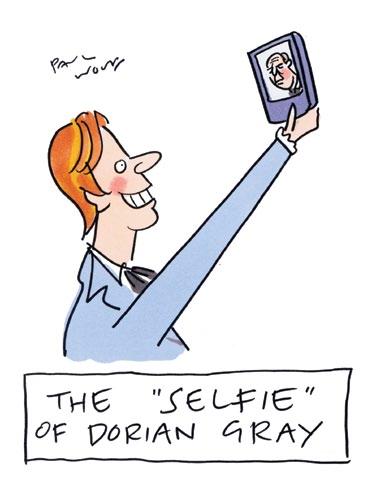
¶ My mum, whose name is Mary, is quite elderly and has a vivid imagination. So when she called me in the middle of the night to say she’d heard a voice speaking to her, I was sceptical.
“Something’s wrong,” she said. “Every so often I can hear someone say, ‘Hello Valerie.’ ”
I told her she must have been dreaming and to go back to sleep. But she called back a few minutes later, clearly worried.
“The voice is still speaking to me,” she claimed. “It’s saying, ‘Hello Valerie.’ ”
At this point my husband, who was quietly cursing at having been wakened, realised what it was—the automated voice in my mum’s smoke detector saying, “Low battery.”
Ann Barnett, Glasgow
¶ A few years ago, I got home from a trip late at night just when a storm was raging. As I went into the bedroom, I saw my wife was curled up with our two children, obviously scared by the noise.
I slept in the spare room, but I had a word with the kids the next day, saying they should only sleep in their mum’s room if there was a bad storm.
I had another late day at work a few weeks later, and my wife and children met me on a packed train platform. My daughter came
running up to me and shouted excitedly, “Don’t worry, Dad. No one slept with Mum while you were gone!”
Rob Aitch, the Wirral
¶ A little while ago, my son announced his engagement to his very charming French girlfriend. With a tight budget in mind, they invited friends and family to celebrate with them at home one evening.
As the tables groaned with every conceivable culinary delight, a request was made: “What about the toast?”
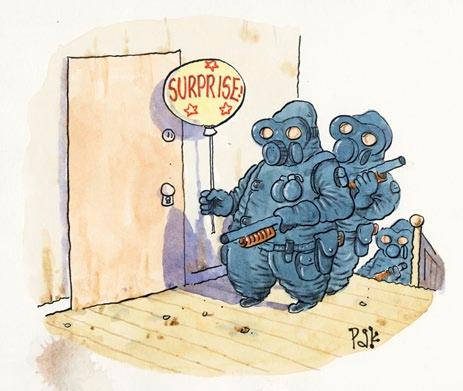
she asked, “Did you know it was slow when you bought it?”
My son’s fiancée looked crestfallen. “I didn’t make any toast,” she said apologetically.
Maria Merrick, London
¶ While having my eyebrows shaped by a young beautician, we got onto the subject of food. I told her all about my slow cooker, waxing lyrical about all the things it could do.
Instead of looking impressed,
¶ my husband and i were on a train in Scotland recently when we suddenly ground to a halt.
After a few minutes, the guard announced that we’d stopped because there
Win £50 for your true, funny stories. go to readers digest.co.uk/ contact-us or facebook. com/readers digestuk
Marie Keating, London
¶ Two of our boys were having a fight in the bedroom. As soon as I heard the noise, I rushed in and separated them. I also spotted a pair of broken glasses.
“I didn’t mean to break his glasses,” insisted the culprit. “I was just trying to smack him in the face.”
Ruth Groome, Northamptonshire
were some cows on the line. The train was stationary for about 15 minutes, then we began moving off.
After about ten minutes we ground to a halt once more. The guard’s voice
came on the loudspeaker: “Ladies and gentlemen, we apologise again for the delay to your journey. I’m afraid we’ve caught up with the cows.’’
Paula Henstock, Yorkshire ■









With the new Formula 1 season revving up this month, try zooming through these words on matters both fast and (for those at the back of the grid) slow. Choose A, B or C below, then whizz to the answers on the next page.
1 torpid adj
A sluggish B streamlined
C explosive
2 velodrome n
A nuclear accelerator
B track for cycling
C air-speed recorder
3 precipitate adj
A gradual B inert C rash or hasty
4 drogue n
A open speedboat
B booster rocket
C canvas parachute to slow a ship or plane
5 tardigrade adj
A restrained B rushed
C slow in pace
6 baud n
A film speed B datatransmission speed
C nautical speed
7 paso doble n
A quick march
This refers to concertgoers who prefer to view a live performance through the screen of their camera-phones, blocking the view for others. Once a minority, they’re now everywhere.
RD Rating: Useful? 8/10 Likeable? 4/10
B shooting star
C time-lapse motion
8 dispatch n
A promptness or efficiency
B postponement
C impasse
9 alacrity n
A ignition
B pause before firing C cheerful readiness
10 tout de suite adv
A immediately
B at a given signal
C haphazardly
11 hang fire v
A to delay B blast off
C streak across the sky
12 adagio adj
A fast B without stopping
C at a slow tempo
13 race runner n
A red fox B large antelope
C type of lizard
14 celerity n
A gear shift B rapidity of motion
C rolling effect
15 catalytic adj
A causing a slowdown
B relating to an increase in a chemical reaction
C precisely timed
Words by Emily Cox and Henry Rathvon9–11 getting there
12–13 impressive 14–15 word-power wizard!
1 torpid A
sluggish. “My 16-year-old daughter is pretty torpid.” Latin torpidus (numb).
2 velodrome—B track for cycling. “Pete enjoyed his bike training at the velodrome.” French vélo (bicycle) and Ancient Greek dromos (a course).
3 precipitate C rash or hasty. “The director made the precipitate decision to have a nap.” Latin praecipitare (to cast down headlong).
4 drogue C
canvas parachute to slow a ship or plane. “The drogue deployed as the plane came in to land.” Originally an 18-century term for a board attached to a harpoon line, used to mark the position of a whale.
5 tardigrade C slow in pace. “The tortoise took great pride in his tardigrade gait.” Latin tardigradus (slow-paced).
6 baud B
unit of data-transmission speed. “I could hand-deliver this message faster than this 300-baud modem!”
Named after Jean-MauriceÉmile Baudot (1845–1903), a French engineer.
John Duns Scotus (1266–1308) was a scholar of Catholic theology, grammar, logic and metaphysics. He’s now regarded as one of the most important thinkers of his day, but during the Renaissance his work fell out of fashion, and his many followers (known as “duns”) began to be mocked for their faulty thinking. This eventually became dunce, meaning someone incapable of scholarship.
7 paso doble A quick march played at bullfights. “The bullfighter grew anxious as the paso doble played.” Spanish paso (step) and doble (double).
8 dispatch A promptness or efficiency. “The thief left the bank with dispatch.” Old French despeechier (to set free).
9 alacrity C cheerful readiness. “Jo got out the biscuits and the kids moved with alacrity.” Latin alacer (lively).
10 tout de suite A immediately. “When the alarm sounded, everyone was on their feet tout de suite.” French.
Play WP online: go to readersdigest. co.uk/wordpower

11 hang fire A delay. “We decided to hang fire at the stage door, hoping for an autograph.”
12 adagio—C at a slow tempo. “That terrible violinist doesn’t know adagio from allegro.” Italian (at ease).
13 race runner C type of lizard. “I saw lots of race runners when on holiday in the US.”
14 celerity B rapidity of motion. “If a skunk hisses, it’s time to depart with celerity.” Latin celer (swift).
15 catalytic B relating to an increase in a chemical reaction. “To see a catalytic reaction, apply a match to Gary’s shoe from behind.” Greek katalutikos (able to dissolve). n




























Hailed as “the undisputed queen of African music”, Benin’s Angélique Kidjo is a Grammy award-winning artist and a goodwill ambassador for Unicef. Her mission is to unite different cultures through music.
I’d be a guardian angel. I’d help people choose the right path and balance in life. if balance is wrong, fractures start to occur. but if we have a society where the majority of people are happy and making good decisions, then there’s less conflict. We’re all in this world together—it’s one big tapestry. if only the threads held firm all the time!
Education would be at the centre of everything. my father sent ten children to school in cotonou, benin, where i grew up, with the right uniform and books. He’d say, “i’m investing in your schooling because i want you to be responsible for your own life.” education teaches us about different cultures, so you learn your way of life isn’t the only one. Particular support would be given to ensure women were educated around the world. in countries where women are educated the GdP increases and those women raise better men.
I’d give men and women equal power. Who decided that eve was the one who tempted adam and not the other way round? Why do women have to take responsibility for the mistakes of men?


my mother treated my brothers and sisters exactly the same: we all cooked, sewed and went to the market.
if i had my way, men would be able to give birth. then we’d be equal. although i think if men ever had to suffer that pain, the population might start falling rather quickly!
I’d teach men that you don’t have to treat women badly to be manly. my father always told us that “machismo is simply a way men express their fear”. if men are trying to be macho, it
shows that they don’t feel secure in their own strength and virility.
Music would be the universal language that links us all together. in so many ways that’s true already, but i’d make it more powerful by removing all the labelling and categorisation, such as jazz, rock, dance and classical. instead it would all come under one simple banner: music. and when you’re listening, i’d make it a law that you must have fun. dance, let it comfort you, lose yourself in the sound— whatever your needs, music helps.
No one would be able to mess with another’s life. there would be no slavery, no apartheid, no death penalty. all human beings can redeem themselves. the greatest lesson i learned from nelson mandela is that forgiveness frees you from hate. and every person who finds space in their heart for love would be my advocate and spread love amongst us.
Dreams would be limitless. don’t dream someone else’s, but see the world the way you want it to be—and work hard to make that a reality. there would be no envy, because that creates greed and war. i learned from my mother at a young age never to wish for things that other people had. i’d like us all to live together in harmony in a rainbow world.
I’d do away with red carpet events. i feel like i’m in a fish in a bowl at
“in countries where women are educated the gdP increases”
them— everyone peering while half the time not knowing who they’re looking at. celebrity is a strange business. Peter Gabriel once said to me, “be careful when you climb up the ladder of fame that you’re good to people, because you might need them on the way down.”
Remind women that their bodies are their sanctuaries. don’t let a man fool you with his sweet-talking, only to abuse you later. Women need to have self-respect, and to stand up and say no to violence. i can’t bear injustice in any form. i grew up in a family where my parents were always fair and i felt loved. this gave me the strength to make good choices in my life.
Any argument would be resolved before going to bed. i said to my husband Jean when we got married, “i don’t want a relationship where silence is part of our dialogue.” Hell no, i refuse to tolerate that— you’ve got to respect your partner and never sulk. i need to sleep with a peaceful mind. ■ As told to Caroline Hutton
Angélique’s new album Eve is released on 429 records, and her autobiography Spirit Rising: My Life, My Music is published by HarperCollins (£18.52; ebook, £7.49).
This isn’t the first time James Brown has gone offline, but
Recently, my girlfriend was bemoaning the amount of time I spend online on a carousel of social media, blogs and websites, when an ad agency asked me if I’d consider joining four other heavy internet users in taking a week offline for a documentary?
I immediately agreed, because I know I’m again in that Sargasso Sea of internet browsing that’s taken up so much of my
internet use. Right now, I’m very aware I should be spending more time with the new baby, and I can’t even remember the last time I walked over the sea wall in front of our seaside cottage and onto the deserted beach there.
I’ve given up more destructive things than the internet, so I don’t think I’ll have problems with the five working days of abstinence. After the first day,
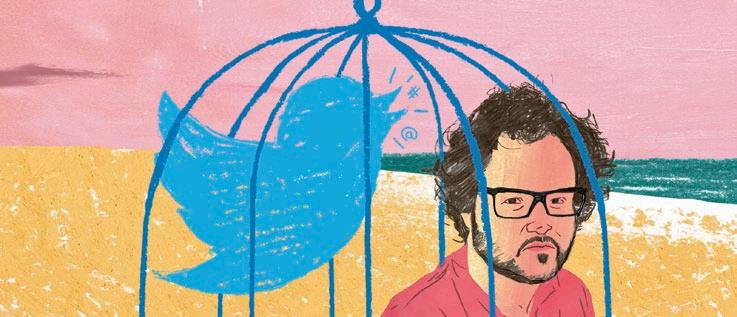
life over the last decade. “Where will the documentary be shown?” I asked. Online. “Ah.” You see, it’s hard to escape.
My keenness for Skype and Twitter means I’ve spent over a decade becalmed, staring at a screen (though I tried to give up Twitter in August). I’m definitely hooked online and sunk on social media.
To be honest, the request comes as quite a relief—especially as there’ll be an addiction counsellor there to discuss our
what becomes apparent isn’t what I miss out on but what I gain.
For a start, leaving the phone out of the bedroom gives me, I’d guess, almost an extra three hours a day for my family, the real world and sleep. Twitter and the bedroom is a dangerous combination.
Normally I start the day reaching for the phone on the delusion that I want to know the time, but actually I’m just reaching for the little blue Twitter bird.
he increasingly finds it a mixed blessing

Equally, I can end the day in pointless spats with rival football fans or just sliding through what other people are talking about. It’s like going through people’s conversational bins. I love the best parts of the online world, but the bits that frustrate me are those times when I’m not really enjoying myself or learning anything. Suddenly, without a phone or computer to hand, all of this is gone.
while moving houses, so I actually set ours up and start watching. Hens Behaving Badly is a real programme, Don’t Tell the Bride is the new car-crash reality hit and, most importantly, Dirty Harry is on. This is the first time I miss Twitter, watching Clint Eastwood in one of his standout roles and not being able to pass smartarse comments and observations to likeminded film fans.

On the second day, I manage to take the baby for a walk in the park, chop a week’s worth of firewood, get a couple of hours’ extra sleep and be more productive at work. Not carrying my iPhone with me everywhere feels like I’ve removed handcuffs.
By day three, it’s pretty easy to figure out how to work without engaging with emails—someone else reads them. I haven’t had a television for nine months
Day four, I wake with some Twitter withdrawal, but for the third night in a row I’ve enjoyed much more sleep than usual. By the end of the week, I realise how much I use the internet to distract myself from work. I have so many ideas for books, but instead I spend the day reading what people are tweeting. I scour my mailboxes and internet for stimulation or any type of distraction. But not this week. I now want to rid myself of
The sense of space and freedom I’ve enjoyed is both revealing and rewarding
all things digital—difficult when I run a digital business for a living—but the sense of space and freedom I’ve enjoyed is both revealing and rewarding.
At the close of the week, Sarah, the therapist they hired to debrief us, is asking how we feel. I say I feel like smashing my phone and just going internet-free— and then the woman next to me in the experiment delivers a brilliant speech about everything that’s great about the internet and social media, and unfortunately I know she’s right.
On the one hand I’m an advocate of how much brilliant stuff there is online, and on the other hand I feel trapped by it. I guess for once I’ll have to try and do something in moderation. First things first: I delete the 40-odd emailing lists I’m inexplicably on and already life feels better. n
James, founder of Loaded magazine, now edits Sabotage Times—an online magazine with the motto: “We can’t concentrate, why should you?” Follow James on Twitter @jamesjamesbrown
This elegiac tale was one of thousands submitted to our 100-Word Story Competition. We’ll be featuring a commended story in the magazine every month. Look out for the winners of this year’s contest in our May issue.

Submitted by Elizabeth Earle, Warwickshire
We were waiting for it. Praying for it. Hating it. So when those skies were replaced by smudged grey, it was all very suitable, appropriate.
I stared at your hands, telling myself to remember every freckle, every line, every scar.
“I should have been there,” I said.
“But he wasn’t,” they replied.
I dreamt of you then, sitting in your chair. I claimed your cardigan from the greedy Samaritans, their fingers twitching and turning over your clothes. You had it for years, but I lost a button within a month. I felt like I had lost you.
Then I remembered.
Elizabeth says: “I wrote the story based around my grandad. We’d been incredibly close, and I wanted to capture one of our private moments—me simply sitting by his bedside and staring at his hand in mine. There had been so much I’d wanted to say to him, ask him. But in the end I realised that none of that mattered. What mattered was simply being there.”
Elizabeth will receive a cheque for £50

Timothy Spall on barging, being comfortable in his own skin and a portly new co-star who has no idea she’s about to be famous
Crom Castle, by the banks of Lough Erne in County Fermanagh, is a proper “come and have a go if you think you’re hard enough” castle—all imposing grey stone walls and daunting battlements. But for the time being at least, this heaviest of facades conceals the lightest of enterprises.
For Crom is standing in for the chaotic stately home Blandings in the second series of BBC1’s adaptation of P G Wodehouse’s stories. And at the heart of these tales is the warm and charming Timothy Spall, who plays Clarence, the head of the eccentric, aristocratic Emsworth family. Reclining in an armchair for our interview in the grand castle bedroom that’s doubling as his dressing room, Timothy makes for delightful company, the air
by james rampton►

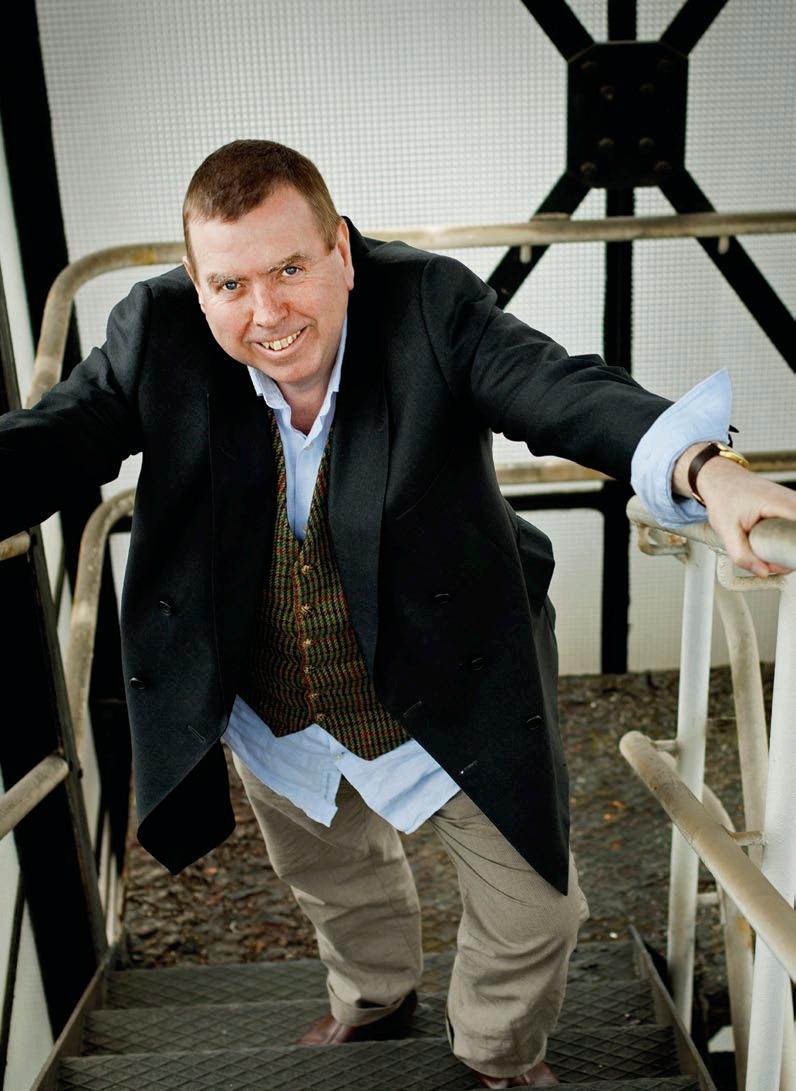
The dysfunctional gang is back, with Doris the pig as the Empress of Blandings
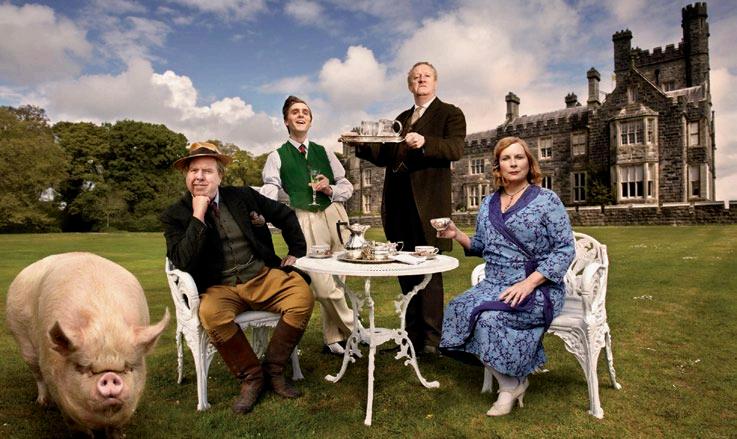
“Doris is about to become a household name”
frequently filled with laughter during our interview.
The 57-year-old, who lives in central London with Shane, his wife of 33 years, is enjoying his time getting away from it all. “I’m very lucky. My wife comes with me, so I bring my life with me to Crom. I love living in London—unlike Clarence, who is bewildered by it and says ‘ghastly people coagulate there’—but it’s nice to get out here to Fermanagh.
“It may not be an obvious choice—but I came here in the middle of the Troubles, and I liked it even then. I was surprised to find out what a friendly place it is. People wave to you when you drive by, and everyone has time to stop for a chat.”
Timothy, who has three grown-up children, Pascale, Mercedes and Rafe
(another well-known actor) has also relished revisiting his Blandings character. “Clarence could be seen as a borderline imbecile. He’s very forgetful and is educated way, way beyond his intelligence. I suppose you could say that of quite a few people in positions of high authority in this country! But he literally wouldn’t hurt a fly. He causes problems and then inadvertently solves them through a combination of lunacy, eccentricity and being very sweet natured.”
Timothy has a deep love of literature, particularly Dickens (his TV credits include Oliver Twist and Our Mutual Friend), but working on Blandings has also kindled a new-found admiration for P G Wodehouse.
“He captures something quintessen- courtesy of bbc
tially English and creates characters who are very precise examples of the aristocracy. They might at first appear cartoonish, but he invests them with a lot of heart. There’s so much stuff about aristocrats who are very serious people wearing expensive hats and being supercilious. But the ship of lunatics in Blandings is the flipside of that. Wodehouse may not be a heavyweight, but he is the absolute king of the light touch. I was delighted by the success of the first series, as it meant a whole load of nine-year-olds were introduced to his work. After all, it isn’t often that one of a novel’s leading characters is a pig...”
Ah, yes, the Empress of Blandings, Clarence’s beloved porcine companion that he cares about far more than anything that’s happening to his dysfunctional clan. She features heavily in the TV series and Timothy, too, has developed a strong attachment to his piggy co-star. “Doris doesn’t know she’s about to become a household name,” he smiles. “She’s new to the role and delivers every time. The old pig [from the first series] was a bit more cantankerous—she didn’t really want to be in showbusiness. But Doris and I have a good rapport. Clarence has a crook, and I use it to scratch her back, which she seems to like. That and all the cakes.”
Since breaking into the national consciousness as Barry, the shambling Brummie electrician in Auf Wiedersehen, Pet in 1983, Timothy has become one of Britain’s most admired actors—though mainly for a series of unglamorous, putupon characters, including the lead role in ITV’s The Fattest Man in Britain rex/october films/everett; warner bros; itv; rex/itv


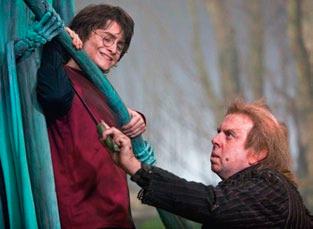

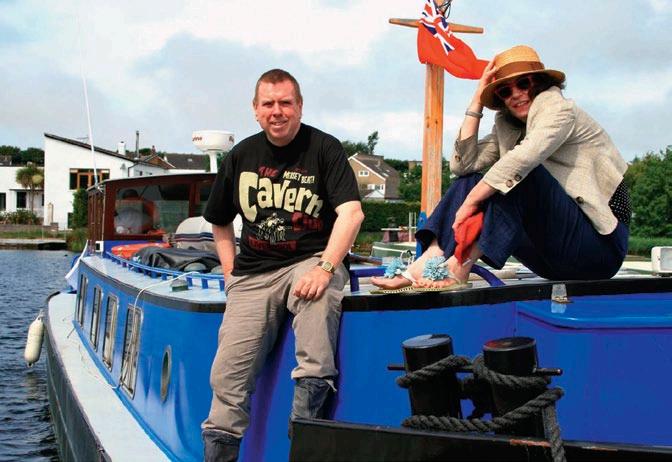
“ t he sea is where the cobwebs get blown away”
and Peter Pettigrew in the Harry Potter films.
“It’s not a struggle for me to look like these downtrodden characters,” says Timothy, with typical self-deprecation. “It would be ludicrous and undignified if I tried to portray myself as a romantic hero. The very idea makes me laugh. It would put people off their tea! But I’m blessed by looking the way I do, so I don’t have to fight against natural beauty!’’
A little more serious for an instant, he adds, “For me, acting is about a bit more than the gratification of your wallet and your ego.” Certainly, his career has veered from the mainstream to much more leftfield roles in Mike Leigh films such as Life is Sweet, Secrets and Lies and All or
Nothing. “On a warm summer’s evening, given the choice between watching the grim goings-on in a Greenwich council estate or a bunch of dashing pirates, I don’t blame audiences for saying ‘I don’t want to waste my tenner. I see the sort of fatso who comes out of those estates all the time in real life. I’d much rather watch Johnny Depp.’ But if you look at cinema as an art form—as I do from time to time—then you want to pursue it at a more advanced, complex level.”
But Timothy doesn’t stay serious for long, particularly when you bring up his great love outside acting: his 55-foot Dutch barge, The Princess Matilda (which is named after his granddaughter).
Timothy is a notoriously unreliable
navigator—who once famously got lost trying to steer his barge back to Chatham Marina in Kent, and had to be rescued by a lifeboat. “Whenever Shane and I go away, I try to kill us both in the boat! A bit of relaxation and the occasional threat of death—what could be better than that?”
But, in fact, he is an accomplished nautical adventurer. Three years ago, he and Shane completed a circumnavigation of the British Isles in Matilda—an epic journey that took six years, including breaks for work, and was detailed in the BBC4 …at Sea series.
He’s still amazed by the achievement.
“We had no back-up boats or helicopters. When things got difficult, we were really in danger.”
Timothy, who bought his barge in 1996 as a gift to himself while recovering from leukaemia, revels in the freedom being out on the ocean brings him. On a beautiful day it is, he says, “the glory stuff. The sea is free. It belongs to us. It’s where the cobwebs get blown away. There’s nothing better than discovering your own country by sea.”
And Timothy is becoming a lot less of
a liability at the tiller these days, having recently gained an international qualification in navigation. “I’ve been studying for it for nine years and I was so worried I’d fail. You need it to go on the inland waterways of Europe. The International Certificate of Incompetence, I think it’s called!”
Timothy also avidly reads books about boating. “One of them says, ‘If in doubt, don’t go out’. That’s got to be the best possible advice. I don’t want to be in ten-foot waves going from side to side. I’ve got some decent wine on board—I don’t want to lose it!”
So where is this most engaging of actors heading next? Well, he plays J M W Turner in a new Mike Leigh film about the painter, due out later this year. But, perhaps more importantly, he and Shane are about to set off on a voyage to New York on the Queen Mary. Would he fancy navigating the mighty vessel himself?
“Of course. It’d be pretty easy,” he says blithely. “It’s a straight bloody line!” He pauses. “Actually, I wouldn’t have my charts with me. So I think I’d just put it into autopilot and put my feet up!”
Blandings is currently on BBC1.

An excerpt from a recent letter to a clearly disappointed customer from WeBuyGold.com: Dear Mr (name withheld), We’re sorry to inform you that the one-ounce krugerrand gold coins that you sent us are, in actual fact, chocolate coins in gold foil, and would not warrant the £30,000 that you requested.
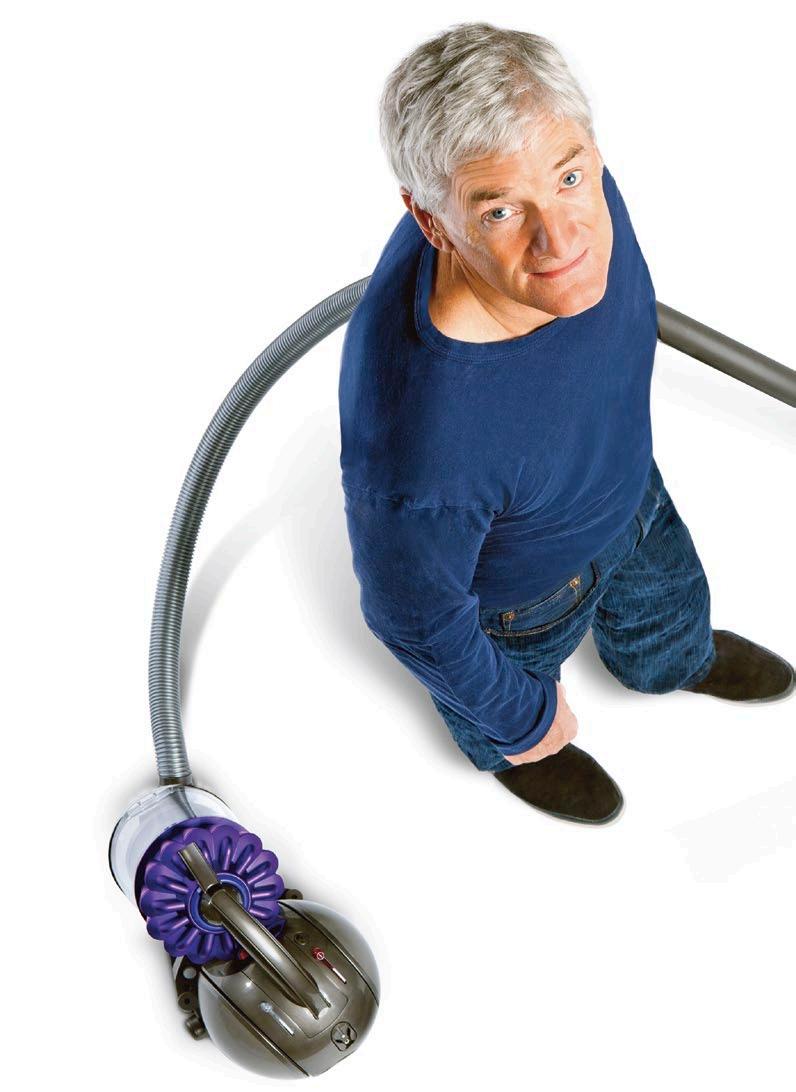
Many of the innovations that form part of our everyday lives had their origins right here in the UK. From the World Wide Web to the humble cat’s eye, we take a look at some of the most significantBy LoLa Borg

James Dyson, 1979
There are some things we don’t know we need until someone invents them. Step forward, the bagless vacuum cleaner. James Dyson was inspired after forking out for an expensive cleaner that simply pushed dirt around. On inspection, the bag was clogged with dust, restricting suction.
Most of us would have left it that, but Dyson went on to change the basic principle of a vacuum cleaner— an idea that hadn’t been challenged for 100 years—by designing a dual-cyclone sucking system that removed the necessity of the bag for good. His final version
►
took five years of research and 5,127 prototypes (he’s said several times that he doesn’t mind failure).
Typically, when Dyson first approached manufacturers with his idea, he couldn’t interest them. But he persevered and set up a factory in Wiltshire in 1993 to produce them himself. We all know the rest of the
story. Two years later, Dyson products were outselling the competition, and now, 20 years on, Dyson’s latest design—the DC52—is the industry’s only cleaner with no bags, no loss of suction and no filter. Not a man to go with the proverbial flow, then. He now campaigns for fair patenting laws for new inventors.
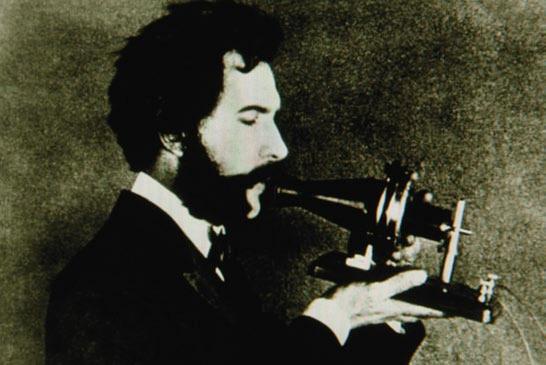
Very few inventions command such a central place in our lives. But, like any revolutionary idea, many claim ownership. (As the saying goes, “Success has many parents, but failure is always an orphan.”) Italian Innocenzo Manzetti built a version of a speaking contraption in 1849, and Antonio Meucci worked for 40-odd years during the 1800s on a variety of prototypes, later hailed as the basis of the first telephone.
But the consensus goes to Alexander Graham Bell, who secured his patent in the US after moving to Boston in 1876. A Scotsman, born in Edinburgh, his formative years were overshadowed by his mother’s
Bell’s first telephone— not exactly pocket-sized
rapidly failing hearing. It’s said that this was the origin of Bell’s fervour for working with the deaf, and of finding new ways to communicate. So with an economic boom in the air and the development of better modes of travel, the telephone was an invention waiting to happen.
Trial products came to fruition after Bell had a fateful meeting with electrical designer Thomas Watson. History was made on March 10, 1876, when Bell spoke into the mouthpiece and declared the now legendary words, “Mr Watson, come here, I want to see you.” Five years after these words were spoken, some 2.2 million telephones existed in Bell’s system and our obsession had begun.

Alec issigonis, 1959
While the Americans were driving supersize Cadillacs, a post-Suez Britain famously went in the opposite direction and came up with a compact car that would become the epitome of cool the world over.
Alec Issigonis, a British citizen of Greek descent, was responsible for the dinky design and carved a niche for himself in motoring—and cultural —history with its launch in 1959 for the British Motor Corporation (BMC). The Mini’s success wasn’t overnight (many thought it “odd”), but it developed into a love affair with the British that’s never abated, helped by the fact that celebrities adored it. Everyone from Twiggy to George Best and all four Beatles drove
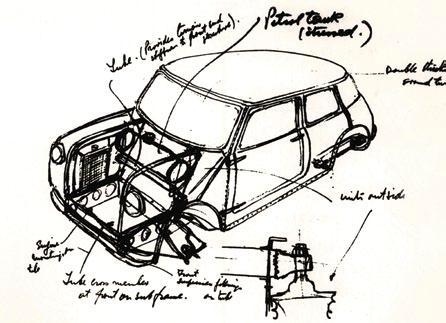
one, Steve McQueen had a gold model, and then there was the memorable game: how many people can you fit into a Mini? (In the classic, it was 25.)
A symbol of the Swinging Sixties, it’s one of Britain’s biggest-selling cars. ►
J s Fry & sons, 1847
The Quaker Fry family had been successfully selling cocoa as a delicious drink, but hadn’t worked out how to produce it as a bar that could be eaten on the go. The snag? It crumbled into pieces. Eventually, Joseph Fry came up with the idea to add more cocoa butter to the mix. His chocolate lozenges (marketed as “Chocolat Delicieux a Manger”) were the very first commercially produced chocolate bars. However, they were expensive and tasted rather bitter, so didn’t exactly fly off the shelves.

Fry’s experiments continued and he eventually added a sweet, sticky fondant to the centre of the chocolate blocks. Thus Fry’s Chocolate Cream was born, which went on to be their biggest seller and the world’s oldest brand of chocolate bar.
John Logie Baird, 1925
We could nit-pick here, as plenty dabbled with the concept of a rudimentary TV. But Baird, another Scotsman, deserves to be honoured as the man who first transmitted moving images via a box.
In the early days of his career, Baird used tea chests, hatboxes, darning needles and various other domestic objects to
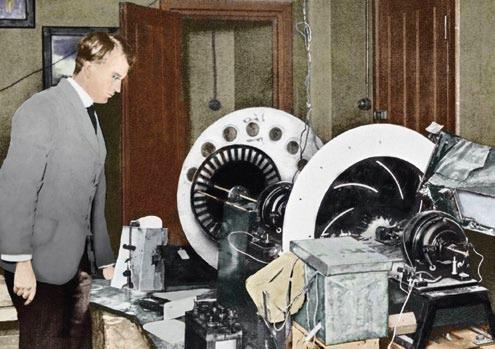
construct his designs. Although primitive, Baird’s idea, based on the Nipkow disk (a previous invention by the German Paul Nipkow), utilised two spinning cardboard discs punched with holes, similar to a child’s flicker book. A tiny Maltese cross was the first transmitted image, while office boy William Taynton was the first person to appear on TV in 1925 (he was too scared to move, and had to be bribed into motion to convince audiences he was real).
Baird went on to develop his idea further, but his inventions faltered as more advances involving electronic transmission came into play. But without his pioneering attempts, just think of the time we could have saved not watching Downton Abbey or Sherlock.

Kate Moss wears Hunter wellingtons at Glastonbury and Dame Shirley Bassey prefers hers diamanté-encrusted. Yes, the Wellington boot still plays an intrinsic role in fashion, though its origins date back to the 1800s when fashion peacock Arthur Wellesley (aka the Duke of Wellington) asked his shoemakers, Hoby of St James’s Street, to modify his hessian boot into something more fancy.

made the style fashionable. The wellie, as we know it today, evolved when tyre magnate Charles Goodyear introduced vulcanised rubber in 1852—it became the footwear of farmers rather than the fashionable, while the North British Rubber Company (now Hunter) made boots for soldiers to wear during two world wars.
An early version was created from soft leather and sat close to the calf so it could be teamed with pantaloons. Society dandies, wanting to emulate their hero,
Today, the Hunter wellington is the boot to wear, but for a very different reason—its status as footwear of choice for celebrities at play.
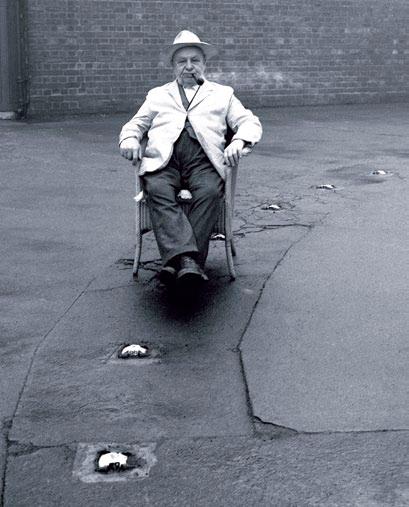
Percy shaw, 1935
As Plato might—or might not—have said, necessity is the mother of invention. While driving home from his local, the Old Dolphin in Queensbury, Yorkshireman Percy Shaw realised drivers needed guidance through dark roads. When the headlights of his car were picked up in the reflection of a cat’s eyes, he had the eureka moment.
A simple design, cat’s eyes are two glass marbles that, like their feline inspiration, reflect light from a car’s headlamps and have a self-cleaning mechanism—Shaw went on to develop his own company to manufacture them. In the late 1940s, when Labour minister James Callaghan gave the go-ahead for millions of cat’s eyes to be used on UK roads, it was claimed that Shaw received a farthing for every one. There are 400 studded on each mile of road, so no wonder Shaw drove around Yorkshire in a Rolls-Royce.

Joseph swan, 1880
Most people would namecheck the American Thomas Edison as the inventor who had the light-bulb moment, but it was Joseph Swan, a chemist and physicist from Sunderland, who first developed the incandescent bulb. They faltered in the early stages, often petering out after 12 hours, but Swan persevered, and his home in Gateshead made history by eventually becoming the first to be lit by electricity. Later, Swan supplied 1,200 lamps to the Savoy Theatre in London, notching up another world record. Swan’s commercial success came when he patented his invention in 1880 and launched production through the Swan Electric Light Company. He later developed electric safety lamps for miners and the use of bromide paper in photographic printing. His innovations earned him a knighthood in 1904 and the coveted Légion d’honneur in France.
tim Berners-Lee, 1989
When handing over the World Wide Web to the universe for free on August 6, 1991, could Tim Berners-Lee have imagined the impact it would have? Possibly not. But it’s one of the few innovations that divides life into two phases—before it was invented and after.
Berners-Lee was a fellow at Swiss research company CERN in 1984 when he worked on hypertext and how it could be linked to the internet, originally to allow scientists to exchange ideas. Prototype software was developed and the concept of the “www” arrived. Berners-Lee has modestly said that his innovation was the next logical step for computers. Later, he admitted that the slash sign (//) in a web address was unnecessary, but “seemed like a good idea at the time”. His gift has netted him many accolades, including an OBE, a knighthood and the Order of Merit (limited to 24 living recipients). During the opening ceremony of the 2012 Summer Olympics, viewers saw Berners-Lee tweeting live, “This is for everyone.” As indeed it is.
Joseph Bazalgette, 1865

Thanks to: Jenny Tucker for research; and Stephen Van Dulken, author of Inventing the 20th Century

Like any major city, London has always produced substantial amounts of waste. Give thanks, then, to Joseph Bazalgette, a civil engineer who developed a farreaching underground sewage system that revolutionised the process of getting rid of waste by dumping it into the Thames estuary far enough away to flow freely into the sea. Until his system was devised, the city had been one big sewer, with a perpetual stench and diseases such as cholera at epidemic levels. But it wasn’t just Bazalgette’s designs that were so impressive—it was his foresight to construct pipes that would function for nearly 150 years and still be large enough to cope with an expanding population. As he said, “We’re only going to do this once.” n
Which British invention sticks out for you? If we haven’t mentioned it here, we’d love to hear about it. Send an email—with a picture if possible— to theeditor@ readersdigest.co.uk.
n ex T mon Th: casTles
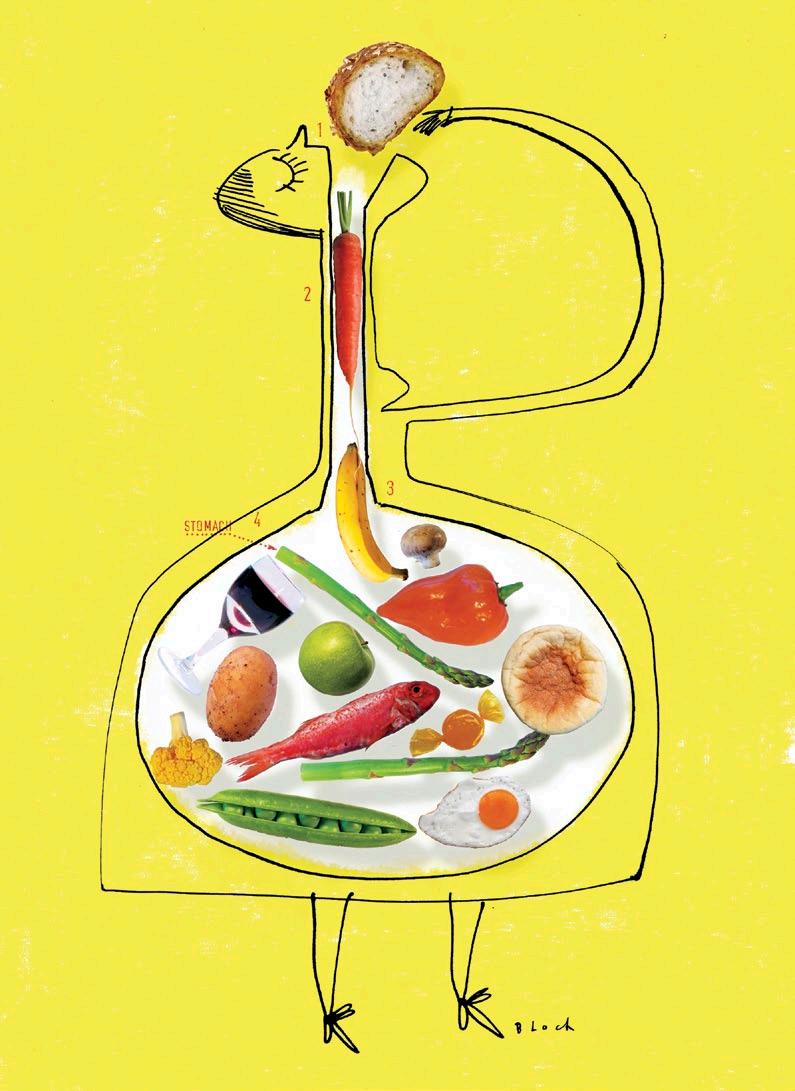
how a bad day can affect your mood, your immunity and, yes, your digestion
By Hug H O’Neill illuSTRATed By SeRge BlOcHIt’s funny how a day can change so quickly. It started well: The Body had one of my favourite meals for breakfast—yogurt and oatmeal with blueberries. I’ll be running smoothly, if you know what I mean, thanks to the fibre in the oats and fruit. Even better, the yogurt is teeming with probiotics—live bacterial creatures that help maintain my gut flora (GF), the amazing microbes inside me that help with digestion and immunity. When my GF are balanced and happy, The Body may be more likely to eat that who-knows-how-old Chinese food in the fridge without getting ill.
But more about that later. It’s only 8.30am and my optimism is fading on the morning commute to work. The Body remembers that late-night email from her boss (“See me at 3.30pm tomorrow.”) It doesn’t sound like a promotion is in the offing. And the traffic is brutal!
It’s time to say hello to stress chemicals like cortisol, which can become my enemies when they are the constant background music of The Body’s demanding days. OK, she gets a lot done, but I pay the price. When her stress hormones spike, her brain signals
of checking her BlackBerry before every Downward Dog.
I think I just felt the gut flora I mentioned earlier kick in. These things— a teeming mass of around 100 trillion micro-organisms that live on my lining —are pretty spectacular. Most of them are solid citizens, little worker bees that help with digestion by breaking down nutrients and keeping various germs in check. That’s why I beg The
Some scientists call me the second brain because I have 100 million nerve cells in my lining
specialised cells in my lining to release inflammatory chemicals. These things are useful if there’s actually an infection to fight. But when there’s no real threat, they cause muscle contractions that can make me bloated and irritated (hello, cramping and the need for the nearest toilet). This can also kick The Body’s irritable bowel syndrome (IBS) into high gear.
That means I have to deal with excruciating, stabbing pains. Fun, eh? Note to self: work out with the brain ways to help The Body relax a bit. Yoga isn’t helpful if she’s in the habit
Body to eat more fibre and yogurt, like she did for breakfast. These “prebiotics” (think oatmeal and blueberries) and the yogurt’s probiotics are like diligent inspectors, allowing the good GF to do their jobs without distraction from the mischief-makers.
That’s right, some percentage of the GF are a bit misguided. And when these bad bacteria run rampant, The Body knows it. I get out of whack and make her feel gassy, bloated, and gross. (Goodbye, skinny jeans.) Some experts say that when I have too many of certain microbes, I might make The Body





Try these top natural solutions for constipation and heartburn
Keep up that yoga: In addition to reducing stress, certain twisting poses improve flow to digestive organs, which may help with constipation.
Pop peppermint: This refreshing plant is an antispasmodic that soothes the digestive tract. Capsules may be helpful for patients with irritable bowel syndrome.
“Root” for these veggies: Your body doesn’t absorb all the carbohydrates in root vegetables like carrots, parsnips, and swede. When those wholesome carbs make their way into your colon, they promote regular bowel movements.
Don’t bolt your food: Long, leisurely meals are the best protection against heartburn. Chew thoroughly to improve digestion and help clear food out of the stomach more quickly. And eat smaller portions: supersize meals can open the sphincter muscle between the stomach and oesophagus, allowing acid to splash up.
» All tips from the medical advisers on the hit US show The Doctors
gain weight, trigger autoimmune diseases and bring on depression. (Thanks, guys—makes me feel great!)
The Body starts beavering away as soon as she gets to her office. I’m starting to feel a little parched—is she really too busy to stop for a water or snack break? When lunchtime comes around, I’m anxious (that 3.30 meeting is getting closer) and famished—a bad combination. Funny how she goes for fast food when she’s feeling stressed. I know she’s going to wolf down that cheeseburger and chips way too fast.
Once the chewed-up, mushed-up lunch arrives in my stomach, I go to work. I start giving it a good massage, flexing my muscles in gentle, rhythmic
contractions to break it down. Then my chemicals kick in—hydrochloric acid dissolves the beef, cheese, bread and chips with the help of those massaging muscles. It’s potent stuff. Think of me as a washing machine, but instead of wringing out stains, I wring critical nutrients from The Body’s food.
I’m a sophisticated piece of machinery, if I do say so myself. By the way, my stomach is probably smaller than you think. Picture a hollow sack, the size of an empty fist, just below the ribs on the right. But I’m very stretchy. At Christmas, I’ve been known to hold two or three pints of turkey with all the trimmings and a whopping portion of Aunt Jane’s Christmas pudding. And ►
I’m savvy enough to process each food group—proteins, carbohydrates and fats—at different speeds and with the help of different digestive enzymes. Fat takes longest, for your information. So this burger lunch, loaded with fat, along with protein and fibre, will take several hours to process.
At her desk after lunch, The Body tries to focus on the 53 unread emails in her inbox, but I can’t help but distract her with my uneasiness. It makes
attention to those cues she’s been getting from Luke that all is not well. The brain gets all the credit, but I’m pretty clever too. (And I’m right about Luke: he’s struggling at maths and doesn’t want to tell The Body.)
It’s time for that mysterious meeting. Cortisol spikes! Heart rate skyrockets! Blood pressure jumps! I wish I could say I stay calm, but I’m in knots. Then my worst nightmare happens: office silence is disrupted by a loud churning, burping noise. Yes, it came from me. Well, you try massaging a big cheeseburger and fries into mere molecules
When The Body takes an antibiotic she doesn’t really need, it gets my blood boiling. An antibiotic may kill some nasty intruders, but it also kills off helpful members of my gut flora defensive team, making The Body more vulnerable to other ailments
her realise she’s worried about her 14-year-old son Luke and his school work. She calls it a gut feeling, and she’s right. Some scientists call me the second brain because I have 100 million nerve cells, called the enteric nervous system (ENS), embedded in my lining. The other brain and I work closely together all day, passing information through our nerve cells and hormones, essentially playing puppet master over The Body’s mood.
When I’m feeling off, I send messages to the other brain that make The Body feel anxious. I make her pay
without a peep! It can’t be done. Thankfully, The Body’s job isn’t in jeopardy; in fact, her boss just wants to thank her for putting in some extra hours last week. She sighs with relief.
As her stress level drops, I go back to digesting that burger properly. Her lunch continues to move out of my stomach and into my small intestine. Actually, there’s nothing small about it. Picture a tube, maybe an inch in diameter, which meanders back and forth through the lower torso for more than 20 feet.
Every bit of this vast surface is a
transit point for the nutrients I’ve just harvested from lunch. They ooze through my intestine walls into the circulatory system, coursing through 60,000 miles of blood vessels to deliver essential raw materials to every inch of The Body.
She decides to hit the gym after work, but I wish she’d wait a bit longer. She just polished off a big slice of office birthday cake, and all that huffing and puffing on the cross-trainer moves the blood away from me and towards her heart and muscles. Fair enough, they’re doing all the work. But still, the intense exercise slows me down. When The Body waits at least an hour after eating, I’m actually a big fan of regular exercise because it makes me more efficient. Aerobic exercise is my favourite. Over time, The Body’s workouts keep my muscles in good shape so they contract more easily
and push food through so I don’t get backed up.
When The Body finally gets home, I want dinner. Greek salad with prawns— yum. It’s an improvement over the burger disaster and I’m excited to get down to business. But…wham! She lies down right after her last bite. It’s tough to blame her; she’s exhausted. But as she hits the couch, all the hydrochloric acid I’ve deployed to digest her dinner sloshes up towards my oesophagus where it definitely doesn’t belong. Ouch! That burns!
A couple of hours later, The Body decides to call it a night. But I never sleep. I’m a round-the-clock organ, turning those olives, feta and prawns into the energy she’ll need to face tomorrow. Instead I’ll try to harness my enteric nervous system to send her sweet dreams. n
» Read more about the body on p103.

What does family mean to you in Britain in 2014?
Could you capture it in a photograph? If so, our great new competition is for you!
All you have to do is take a compelling picture that sums up your sense of family life. We’re looking for unusual approaches, so don’t restrict yourself to portraits of mum, dad and the kids. Families come in all shapes and sizes these days, so use your imagination. The competition will be judged by the RD team and award-winning photographer Barry Marsden, and the winning entries will be published in a future issue. To get your creative juices flowing, here are two of our regular photographers’ tips for taking great pictures.

The most important thing is to carry a camera around with you at all times. Get to know your camera and what it can do. Use manual settings as much as possible— this allows you to take pictures in situations when you shoot in difficult lighting or have the sun in the lens, for example. Now that everything is digital I’d also say shoot as much as possible because it doesn’t cost anything.
Kids find wonder in the simplest things so as a photographer it helps to be ready for those moments. The interaction between grandparents and grandchildren is unique and the connection across generations is sometimes best captured in a photograph. Frame your subject well in accordance with its surroundings. Get close to the action, or your subject, and choose your angle carefully. A slightly odd angle can add a dynamic element to a photo. Make yourself invisible as the photographer and let scenes unfold themselves—sometimes this is how those special moments materialise.


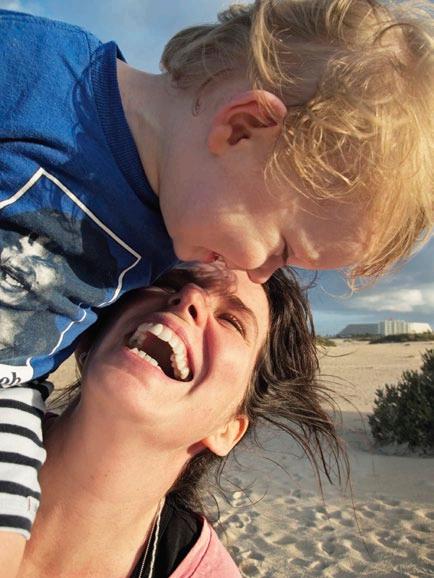
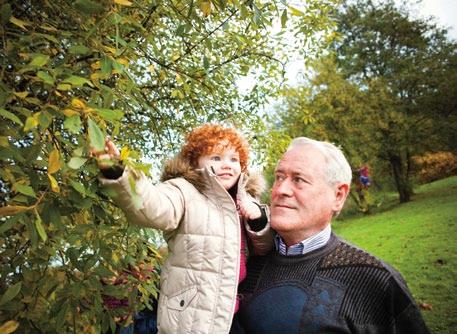
J Take a high-resolution photo with either a phone or digital camera. After saving it as a jpeg no larger than 2MB, please send it as an attachment to rdphotocomp@readersdigest. co.uk by 5pm, April 30, 2014. (Please include a brief explanation of who’s in the picture.)
J There are two categories—one for adults and one for under-18s.
J In the adult category, the winner will receive £500. The under-18 winner will receive £250 of high-street vouchers for a store of their choice.
J Please put either “Adult” or “Under 18” in the subject line of your email.
Rules: Please ensure that pictures are original and not previously published. Please include your full name, age, postal address, email address and daytime phone number with all correspondence.
If you are under 16 you must ask your parent or guardian’s permission to enter this competition.
We may use entries in all print and electronic media. We cannot acknowledge or return your entry. Contributions become world copyright of Vivat Direct Ltd (t/a Reader’s Digest).
Entry is open only to residents of the UK, Channel Islands, Isle of Man and Republic of Ireland. It is not open to employees of Vivat Direct Ltd (t/a Reader’s Digest), its subsidiary companies and all other persons associated with this competition, their immediate families, and relatives living in an employee’s household. The judges’ decision is final. n

Their tiny plane had flown into an Alaskan mountain, and the pilot was dead. How could the Evans family possibly survive?
pH otograp H s
By Davi D Wrig H t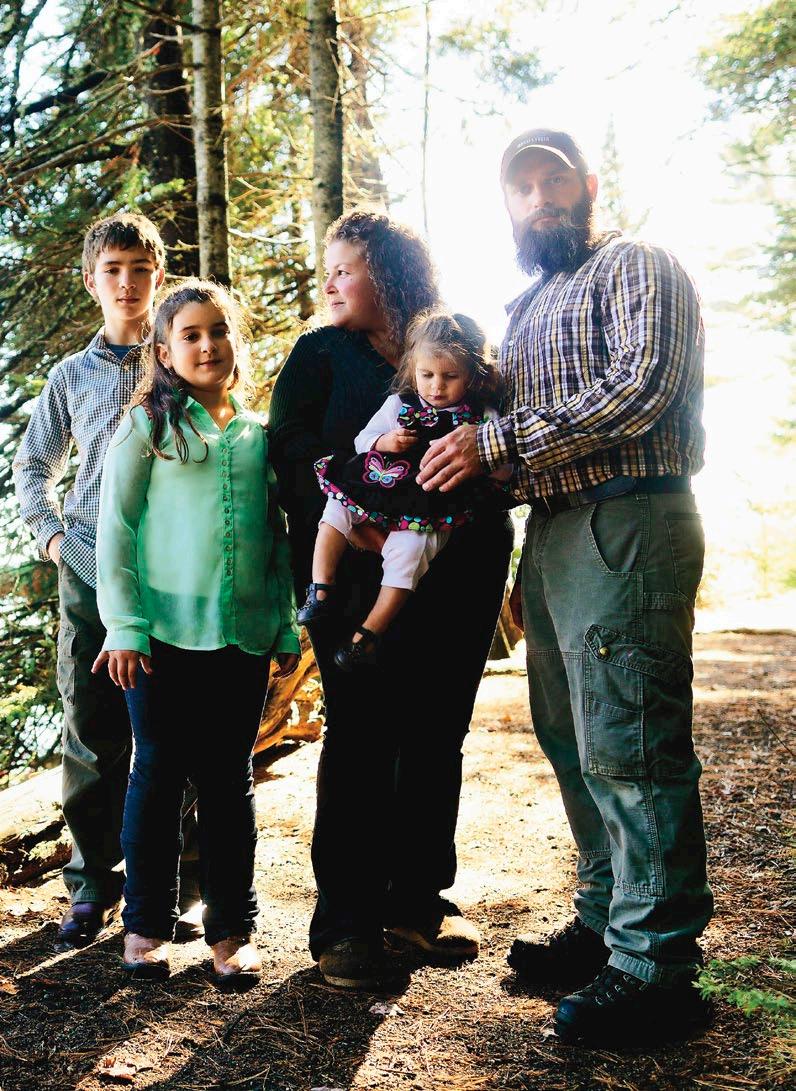 Flying into danger— from left: Donnie, Mckenzie, Rosemarie, Willow and Donald
Flying into danger— from left: Donnie, Mckenzie, Rosemarie, Willow and Donald
The last thing Donald Evans remembered was shouting, “Pull up!” to the pilot seated beside him, before the single-engine propeller plane slammed into a low mountain 37 miles west of McGrath, Alaska. One look now told him the pilot was dead. So was the woman sitting behind Donald, a popular schoolteacher called Julia Walker. Donald twisted in the six-seat Cessna 207 and looked behind him. The plane, hardly bigger than a small van, had snapped in half on the mountainside. He couldn’t see or hear his two children, Mckenzie, eight, and Donnie, ten. His wife Rosemarie, two months pregnant, was slumped motionless in her seat. Donald’s mind filled with a single, horrifying thought: everybody’s gone.
Still buckled in his seat, Donald, 32, tried to get his bearings. The rain was pouring. Some of his teeth were missing. Later he’d find out that the impact had broken his back, legs, feet and jaw.
Then Donald heard Mckenzie crying somewhere outside. She’d been sitting in the back row, and the impact had thrown her 20 feet from the plane. Donald didn’t know it yet, but his daughter’s arm was broken and her intestines were severed, possibly by her seat belt.
Despite his injuries, Donald crawled out to Mckenzie, who lay soaking wet in the rain. Worried about hypothermia, he removed her wet clothing and wrapped her in a quilt the family had packed. Together father and daughter dragged themselves back to the plane, where Rosemarie, 32, was starting to regain consciousness.
Her back, feet, ankles and right arm were broken. She was terrified that the baby she was carrying had been hurt. The only part of her body she could move
was her left arm. Donnie was alive somewhere—they could hear him screaming.
After the crash, Donnie had partly rolled underneath the plane before the floorboards came to a rest on his legs and waist, trapping him. “There was no way I was going to be able to yank him up,” Donald says. He heaved himself to the roof and crawled to Donnie, letting himself fall from the top of the Cessna to land beside his son.
Donald feared the boy might die if he wasn’t stabilised and his head wasn’t elevated. He noticed a splintered log nearby from a willow tree that had probably snapped in the crash. “I was able to take that and support him,” Donald says. Then he found the pruning tool he’d packed and used it to cut away the floorboards to stop them from crushing his son. “Give Daddy a couple more minutes,” he reassured Donnie. “I’ll cut you out of here.”
Meanwhile, in the middle row of seats, Rosemarie was slipping in and out of consciousness, coughing up dark blood.

“I can’t breathe!” she yelled. Donald turned his attention to her.
His adrenalin had ebbed, and by now he was feeling the pain of his own injuries. He forced himself to crawl back to the front of the plane and shift the pilot’s body away from his wife.
Donald and Rosemarie had been heading to Anvik, a village 350 miles north-west of Anchorage, to begin their first year of teaching. It was August 13, 2011.
Both of them had grown up in upstate New York. They were 15 when they met
at a cinema and started dating. Two years later, Donald joined the US Marine Corps.
During one 30-day leave, he told Rosemarie, by then his wife, that he wanted to visit somewhere spectacular. He caught a flight to Fort Richardson, near Anchorage, on a military plane. “Within four or five hours of landing, I knew this was it,” Donald says. When he arrived home, his truck had Alaska number plates.
After four years in the Marines, Donald enlisted again, this time with the army. The couple hoped to be stationed in Alaska, but Donald was sent to Iraq instead. When his military service ended ►
in 2007, he and Rosemarie settled in Wasilla, Alaska, and enrolled in Alaska Pacific University. After graduating with teaching degrees, they were offered a job-share in a teaching position at Blackwell School, a two-classroom primary school in Anvik.
A village of fewer than 100 people, Anvik is where the southern route of the famous Iditarod Trail Sled Dog Race meets the Yukon River. Snowmobiles outnumber pick-up trucks. A lettuce costs nearly £3.50.
The family arrived there in June 2011, weeks before the start of term, eager to start the next stage of their Alaskan adventure. Their first flight in a small plane was smooth, and the weather was sunny. “As soon as we landed, a big black bear ran across the airstrip and stood up,” Donald says.
They met Julia Walker, the only other teacher in the village. Donnie and Mckenzie made friends with the local children, and Donald spent the summer working on the school’s new playground. At night, they played basketball in the school gym.
A week before classes began, the teachers flew to the school district headquarters in McGrath for a series of meetings. On a hunch, Rosemarie bought a pregnancy test and found she was expecting a baby. The prospect left her and Donald excited and nervous, but suddenly the decision to share a job made more sense. Donald would be able to teach during Rosemarie’s maternity leave.
At the end of the week, the family and Julia packed groceries and school supplies in the little Cessna and waited for a break in the weather to fly back. Pilot Ernie
Chase, 66, had grown up in Anvik and flown the route countless times. Just after 7pm, he decided they had an opening.
As their plane prepared to leave McGrath, Donald and Rosemarie felt the splitsecond whirl of apprehension familiar to all village flyers. Would the weather hold? Would this be the flight where something went wrong?
Rosemarie, in her first trimester, felt sick as they took off. The Kuskokwim River disappeared hundreds and then thousands of feet below. Donald watched for moose and bears. The children sat with books. Even with little turbulence, Rosemarie vomited. Julia helped her clean up and then retreated into her iPod.
Within minutes of take-off, the plane was encased in clouds. “This is pretty bad,” Donald remembers the pilot saying. All he could see was white. Donald swivelled in his seat, disappointed. “Sorry, babe. We’re probably going to turn around,” he told Rosemarie.
“No big deal,” she replied.
Chase dipped the plane close to the ground, looking for clearer sky. The Cessna climbed and dipped again. Then he must have spotted something to his left, because the plane banked hard to the right. The clouds broke just in time for Donald to see the mountainside fill the windscreen. “Please, God, protect my family,” he prayed.
Less than an hour had passed since the crash. Rosemarie could hear birds chirping. It was still light but growing colder. Donald crawled to the front of the plane
and tried to make radio contact to call for help. No one answered. He pressed the button on the emergency locator again and again.
The device sent a satellite message to the pilot’s family in Wasilla at 8.30pm. The airline, Inland Aviation Services, immediately launched planes to search Chase’s flight path. Bad weather cut short the effort, but pilots in other small planes in the area told the Alaska Air National Guard that they’d heard a distress signal from an emergency locator transmitter.
Donald could hear, but not see, planes above the clouds. The family knew they were only a 20-minute flight from McGrath. Surely they would hear a rescue helicopter soon. The combination of wind and rain left Donald as cold as he had ever felt. Sometime before nightfall, he heard wolves howling in the fog. “Everybody started screaming,” he says. “I was just begging them to stop.”

The sun went down at about 10.45pm. The wolves never appeared. Neither did the helicopter.
Rosemarie gripped Donnie’s hand, and Donald held Mckenzie. As darkness fell, Donald yelled to his family every few seconds and got them to yell back. He was afraid they’d die if they fell asleep.
To stay awake, the family sang a children’s poem Donald and Rosemarie used to read to Donnie when he was a baby: “These little hands are held in prayer/ To thank you God for being there...”
An Air National Guard HC-130 left Anchorage at 1.25am, tracking the emergency locator signal. It flew over the crash site at about 3am. But cloud cover prevented rescuers from seeing the wreckage. After two hours, the plane returned to Anchorage to refuel. The family could hear it circling. Then silence.
By morning Donald was afraid the search had gone on so long that it would shift from a rescue mission to a recovery effort. “We didn’t have much longer,” he says. He found a bag of clementines that they’d bought in McGrath and tossed one to each family member. “Here, guys, this will bring a little sunshine into our lives right now,” he said.
It was a last meal. After they ate, Donald told the family they could go to ►
sleep. “I guess he just wanted us to be at peace,” Rosemarie says.
The family wasn’t aware that at 9am, an Air National Guard helicopter had left Anchorage to return to the crash site. The refuelled HC-130 followed minutes later. Less than five minutes after finishing their clementines, the family heard the sound of helicopter blades.
Alaskan para-rescuers, known as Guardian Angels, hit the ground at 11.05am, after a break in the clouds. Two dropped from the helicopter, which couldn’t land at the wooded crash site. Another three jumped from the plane to a nearby field.
“We’re going to help you,” the rescuers said as they studied the crash site.
“My wife’s pregnant. Take her first,” Donald told them.
The family had been stranded for more than 15 hours when Rosemarie was hoisted to the helicopter in a long basket. She was flown to McGrath, where she waited for the rest of the family to be picked up. Then they were all flown to a hospital in Anchorage.
Surgeons removed Mckenzie’s appendix and reattached her intestines. They cut Donnie from ear to ear to pull a section of skull back into place. Rosemarie and Donald were confined to wheelchairs because of broken backs and told that their unborn child might not make it.
As the weeks passed, the warnings stopped. Rosemarie—rods and screws still in her back—gave birth to a healthy baby exactly seven months after the crash. The couple named the girl Willow, after the tree branch that Donald used to save his son; Julia, after the teacher
who lost her life; and Grace “because it’s by the grace of God that we’re all here”, says Rosemarie. Willow Julia Grace Evans is now a healthy toddler.
After the crash, the Evanses moved to Maine, to be closer to family in New York as they recover. “A piece of us is still in Alaska and probably always will be,” says Rosemarie. “But our circumstances have led us back east.”
Mckenzie and Donnie recovered quickly and are thriving in their new home. Mckenzie has taken up the saxophone and loves horse-riding. Donnie loves running.
Donald and Rosemarie haven’t fared as well physically, although their attitudes remain upbeat. A string of operations has kept them from returning to work, and they now get by on money from the airline’s insurance. “We’ll never have full use of our bodies,” says Rosemarie. “But we choose happiness. We endured for one another.” n
Does this picture, seen in the window of a local takeaway, tempt you to go for option two?… Many thanks to E T Smith from London for sending this in Fair Means or Foul?











Our fantastic invisible hearing aid is small. Really small. And, because it fits slightly deeper in the ear canal than your average hearing aid, it’s virtually invisible when worn. That means you get all the benefits of hearing better without anyone understanding how you do it.
Whilst it can’t be seen the difference can be heard.
Just because this hearing aid is small doesn’t mean it’s less effective. We’ve made sure this tiny device has the high speed processors and clarity enhancing features of the very latest hearing aids. These are the things that make sure you get to enjoy all the great things life has to offer like conversations with friends and family, an evening out in your favourite restaurant or a cosy night in front of the TV. And you can enjoy all this with the confidence that whilst people might notice the difference in your hearing they definitely won’t notice your hearing aid.
If you like what you (don’t) see, call 0845 203 7662 and book a free appointment in store to find out more about this amazing little hearing aid.
“I hear normally, it’s as if I don’t have a loss and, because you can’t see them, no one else knows I do!”

Free hearing check
To book your hearing check simply call 0845 203 7662
Terms: Valid until 25 March 2014. Free hearing check for over 18s only. Only one free hearing check per year.



…my mum sulwen telling me that my sister had named me tanni. I was born Carys Davina GreyThompson on July 26, 1969. Sian, who was two then, was expecting the new baby to be the same size as her, so when she first saw me she called me “Tiny”. But it came out a bit slurred and sounded like “Tanni”. Mum told her, “No, Sian, it’s Carys.” But my big sister was just as stubborn then as she is now and Tanni stuck.
…the other kids helping me up the steps at primary school. I was born with spina bifida and walked with a frame and leg braces. As I grew, my legs could no longer support my weight, and by seven I was in a wheelchair. But the children at my primary school, Birchgrove in Cardiff, didn’t look at me as different from them, even though you didn’t see that many disabled people around in mainstream school back then. They didn’t even think about discriminating against me or being horrible to me.
…playing rounders. The teachers always involved me in sport. But when I hit the ball, because I couldn’t move that quickly, the fielders were only allowed to walk to retrieve it, not run. Today, teachers and coaches go on courses to learn how to include disabled people. Back then, they just found a way.
…going on a horse-riding holiday to bridgend when i was ten. Other mums with disabled kids who we knew were shocked. “You’re not letting Tanni go?” One mum said that her daughter couldn’t go because she would miss her bedtime story and cuddles. The girl was 21. But my parents [Tanni’s father Peter was an architect] didn’t wrap me in cotton wool. People thought they were hard on me, but I didn’t see it that way. They were just keen to give me opportunities; they knew that I needed to be independent. There were no disabled toilets or drop kerbs on that course at Bridgend. But I loved it. In a chair
“My parents didn’t wrap me in cotton wool. They knew I needed to be independent”
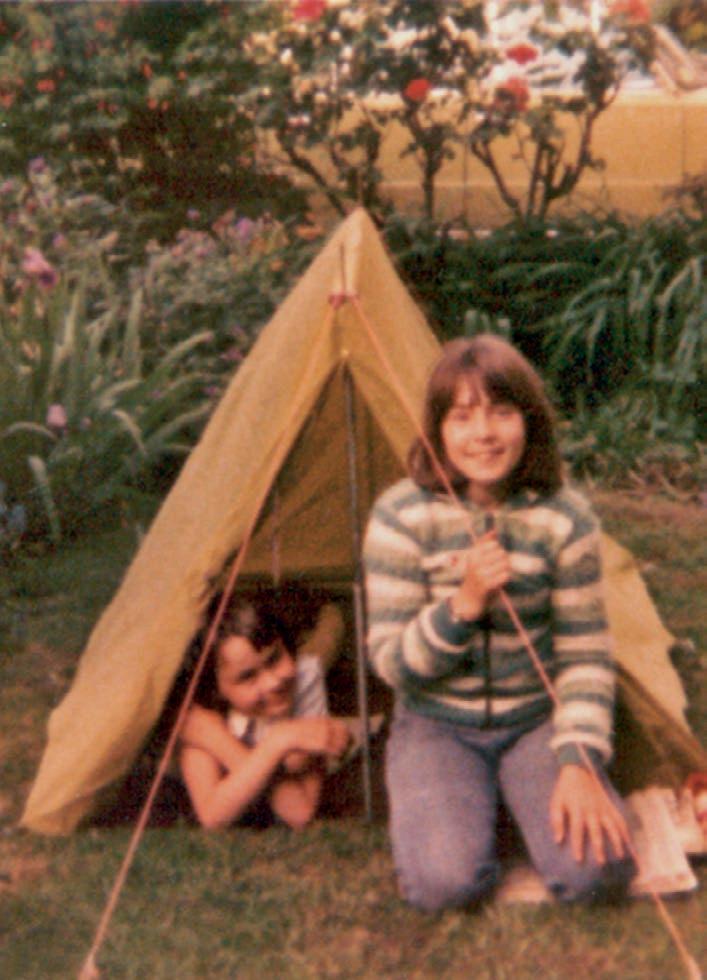
“Who’s got the pegs?” Tanni goes camping with best friend Sue Roberts
you were always the smallest. On a horse you were high up, bigger than everyone else.
…my parents fighting to get me into a mainstream secondary school. Disabled children had no automatic right to be in one back then. Segregation was the norm, but my parents weren’t impressed with the standard of education at the local special schools. You couldn’t even do O and A levels, just CSEs in maths, English and home economics. I didn’t want to learn how to make a cup of tea and cheese on toast. I needed an education. So my parents got me into St Cyres School in Penarth.
…a scary pe teacher called ms colville. In one of my first swimming lessons at St Cyres I was sitting on the sidelines. She said, “Can you swim?”
“Yes,” I said.
“Right: next week, you’re swimming.”
And that was it, and I did things like tennis and athletics, even if I occasionally had to be timekeeper. Sometimes I had to go to the special school to do PE—they supposedly had specialist facilities and teachers—but I didn’t like it there. All my mates were at St Cyres. Playing sport with friends is important for girls. But I did my first wheelchair race at the special school. I was 11 and it was during a sports day.
…being selected for wales, aged 12, to compete at the national junior disabled championships. I got the letter at school. Everyone at home was really excited. It was a really big deal, a stepping stone to other things. The tracksuit was quite nice too. At the 1988
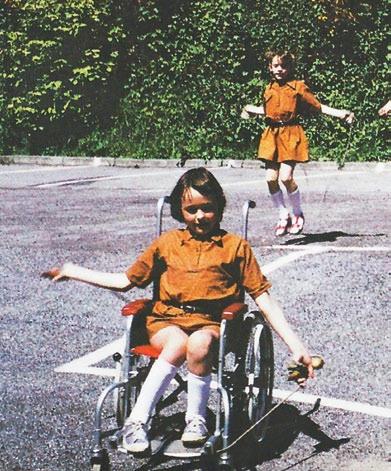
Seoul Paralympics, the US team turned up in banana-yellow jogging bottoms and red satin jackets. By comparison, I’ve always had quite a good deal with the British uniforms.
…a careers officer telling me to stop doing my a levels and get a job as a telephone receptionist. That’s all people in wheelchairs could do, apparently. I told him that I already knew how to answer telephones. Very politely, of course. He sent me to the head teacher for insubordination. The head teacher agreed with me, however, that I should go to university, and I went to Loughborough University to do international relations.
…finally beating an athlete called sarnia offside. She was the top junior wheelchair sprinter in the country, but at my last British junior event in 1987, I beat her. Development is about
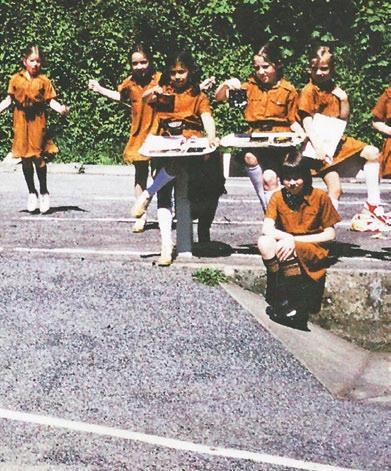
From Brownie camp to the Paralympic village in Seoul in 1988, Tanni’s always been determined to push herself
taking small steps forward. Every time I’d lost a race, I was determined to go a bit quicker. I broke the British record for 100 metres in that race.
…being picked for my first paralympics. I was 19 and just home from university. My mum said there was a letter for me. “Dear Tanni, you have been chosen to go to Seoul.” Mum was thrilled. She gave me a hug. “Go and find your dad, he’s in the garden.” I phoned my sister, my grandmother, my university housemates… I was actually going to the Paralympics!
“A careers officer told me to stop doing my A levels”

colour, so many competitors —2,500 sitting in the dining room, eating, together. I was representing my country! At the Olympics! Wow! And I got a bronze in the 400 metres, which gave me the belief that I could go on to greater things.
…meeting a paralympic athlete called ian thompson during a training camp at Stoke Mandeville. I knew him a while before we started going out. I thought he was obnoxious at first, but we were married a few years later in 1999. My wedding dress fitted perfectly over the wheels of my chair.
…the great welcome at seoul airport. Volunteers and fans were cheering us on. The opening ceremony was amazing. So many people, so much
…racing every day in the barcelona paralympics in 1992. Or at least, that’s what it seemed like. I was in the 100 metres and the 200, 400 and 800, and the relays. You’d race, rest, sleep and then get back on the track

Winning for fun: Tanni won four gold medals at Sydney 2000. (This picture was taken by her sister Sian.)
the following day. I had to wait until the final race was over before I could celebrate [Tanni won four golds and a silver]. I was so exhausted, I had ice cream rather than alcohol. We had a competition to see who could eat the most Magnums. I managed three. Not sure that’s better for you than a few drinks.
…meeting a man with a papiermÂchÉ head at the start of the 1993 london marathon. It was my second race [Tanni won the event six times between 1992 and 2002], but the wheelchair racers always finished before the fun runners had reached the part of the route where the two courses converge. The marathon was amazing. Just the size and scale of London. So many people turned out to watch. Didn’t like the cobbles, though. Vile.
…bumping into colin jackson during the athens paralympics in 2004. He was working for the BBC and they’d been scheduling all my races to go live on TV.
But when the 400 metres was rescheduled for first thing in the morning, I thought I’d have at least one race where no one in Britain would be watching. One where, if I didn’t win, it wouldn’t matter. But Colin informed me that my race would be live, too—on the BBC’s breakfast news. I was like “What?” And I had to be down at the canteen at four in the morning. [But Tanni did win gold.]
…my daughter carys putting ice cream before her mother. I’d just lost the 200 metres, my strongest race. And lost spectacularly. I was really upset and everyone was commiserating with me. Except Carys. She was munching away on an ice cream that she’d somehow managed to get from a race official. Someone I know well. Apparently, Carys had told him, all sad-eyed, that mummy was too busy to buy her a treat. She was an expert at getting stuff like that.
…deciding to retire after athens. It was a relief. I’d competed so long [Tanni’s Paralympic medal tally was 11 golds, four silvers and one bronze], and when you’re older you can’t recover after races as quickly. I was fed up with training and fed up with being apart from my family for long periods. In your twenties, it’s good being away, travelling
with the team, sharing rooms. In your midthirties, it’s not the same.
I didn’t want to be Tanni Grey-Thompson, Paralympian, any more.


…my first speech in the house of lords. [Tanni was made a crossbench peer, Baroness Grey-Thompson of Eaglescliffe, in 2010]. It was terrifying. All those people in the chamber. All that experience. Luckily, I only had to speak, briefly, about the 2012 London Paralympics. Everyone congratulated me. They were all very kind. I’ve always been passionate about campaigning, so when I got the chance to sit in the House of Lords, I took it, even though I was reluctant to be away from my family again.
Making time for family: with daughter Carys and husband Ian
…still occasionally being treated like i’m stupid and can’t do anything, just because I’m in a wheelchair. You’ll get some old lady in a shop, trying to be kind, who’ll say, “Put your money back in your purse, dear.” Thanks. Because I was obviously just about to throw my change all over the floor! ■ As told to Crispin Andrews
Tanni is a trustee of the Laureus Sport for Good Foundation.
The stiff upper lip might be a national cliché, but these historical examples of classic British understatement still make us swell with pride:

“It was rather a serious evening, you know.” Scottish aristocrat Sir Cosmo Duff-Gordon on surviving the sinking of the Titanic (1912).
“A bit sticky, things are pretty sticky down here.” Brigadier Tom Brodie (left) during the Battle of the Imjin River, which claimed 610 of his men (1951).
“This structure has novel features, which are of considerable biological interest.” Scientist Francis Crick on the discovery of DNA (1962).
“We are in a very tight corner.” Explorer Robert Falcon Scott in a letter to his wife, when he and his fellow explorers were about to die (1912).
We all know that good relationships make for a happy life—but how can we best achieve them?
If your AmbItIon Is to le Ad a satisfying life, your best bet is to cultivate connections with other people. When it comes to relationship advice, though, it’s also wise to approach conventional wisdom with a critical eye. We’ve culled the data, consulted the experts, and arrived at five essential lessons.
lesson 1
r AdIcAl AcceptAnce sAves the dAy
n The idea that we can fix perceived flaws in our partners, friends, parents and grown-up children remains tantalising. A healthy dose of ego often convinces us that our way of looking at things is right. Yet trying to “correct” someone else usually backfires, according to psychologist Paul Coleman, author of “We Need to Talk”: Tough Conversations with Your Spouse. “It implies that we have a deeper knowledge of what’s best,” he says. The other person may get
the message that they aren’t good enough and become resentful.
A healthier approach? If your partner hates large gatherings, consider attending the next party solo so he doesn’t have to make forced conversation and you don’t have to leave early. Or if your son doesn’t want to go to university for now, try to express enthusiasm for his budding career as a nature guide instead of bombarding him with prospectuses.
This involves the recognition that you’ll never agree on some things. “You have to say, ‘We have this permanent difference, but we need to learn to live with each other’,” Coleman says.
lesson 2
benIgn neglect Is good for KIds
n Parents who hover relentlessly provoke eye-rolls from developmental experts and teachers alike.
“Parents lack trust in children’s ►
 photography by joshua scott; i llustration by j oel h olland
photography by joshua scott; i llustration by j oel h olland
desire to be competent and don’t accept that nature will influence the course of development,” says Hara Estroff Marano, author of A Nation of Wimps.
But regularly stepping in to protect kids from stress may hurt them in the long run. Michelle Givertz of California State University, Chico, has studied hundreds of parents and their children—and found that overparenting leads to depressionprone, aimless kids (and later adults). She’s also found that children used to getting whatever they need without effort may end up feeling entitled to everything they want—while also lacking the ability to achieve it.
It’s better to let children live with occasional disappointment and resolve their own problems as much as possible, while assuring them that their feelings are heard (even if you’re the one saying no) and that you’re available for moral support. Trust in their capability to tackle obstacles. “Our job as parents is to help kids become self-sufficient,” Givertz says.
n The key to a happy relationship is choosing someone who is, quite frankly, a lot like you—a person who validates your views and habits. Studies have repeatedly shown the importance of shared values, economic backgrounds, personality traits and religion, as well as closeness in age.
Glenn Wilson, a psychologist and professor at London’s Gresham


College, developed a compatibility questionnaire covering lifestyle, politics, attitudes to child rearing, morality and finances. He found that partners who answer comparably are likelier to report satisfaction. Still, he says, “when couples are overly similar, it can be a bit of a brother-sister relationship—too predictable, without a lot of novelty”.
So what’s the happy medium? Seek a partner whose passions differ enough to expand your experience, but who is similar on the big issues: how to show affection, what constitutes a moral life and how to bring up children.
n We’ve all heard the usual advice for living longer: exercise, don’t smoke, limit junk food. But friendships are just as important. “The higher the quantity and quality of your relationships, the longer you’ll live,” says Bert Uchino, a psychologist at the University of Utah.
Julianne Holt-Lunstad of Brigham Young University collected data from 148 studies of the relationship between
health and human interaction. She found that, over a period of about seven years, people with active social lives were 50 per cent less likely to die of any cause than their non-social counterparts. A low level of social interaction has the same negative effect as smoking 15 cigarettes a day.
Psychologist Sheldon Cohen of Carnegie Mellon University gave subjects nasal drops containing a cold virus. Those who reported the greatest diversity of social ties were four times less likely to develop colds than those reporting the least.
n Too often, couples assume that a relationship is beyond repair when the intense romantic excitement ends and the arguing begins. “The immature part of us loves the idea that compatible people don’t have conflicts,” says psychologist David Schnarch, author of Intimacy & Desire. But research doesn’t support this.
University of Denver psychologist Howard Markman, co-author of Fighting for Your Marriage, says that successful couples argue—it’s how they do it that matters. (Among other things, happy partners refrain from nasty zingers.) Airing grievances lets both people speak their minds and take responsibility for their mistakes.
It’s also normal for desire to wane. “Romantic love is when we have this consuming emotional experience, and it usually lasts about a year and a half,” says Will Meek, a psychologist at the University of Portland. “Deep love comes after we see how imperfect the other is and commit to them anyway.”
Rather than get caught up in complaints, psychologist Harriet Lerner, author of Marriage Rules, suggests that you work to restore the old intimacy. That might mean initiating something new in your sex life, or perhaps it’s as simple as recycling that pile of boxes that’s been annoying her for months. “People know what warms their partner’s heart,” Lerner says. n
© 2012 e lizabeth Werness. Psychology Today ( s eptember 2012), psychologytoday.com.
Do you have a pressing query? Yahoo Answers is a web forum where users can pose any question they like—although not everyone takes it seriously…
Where is the Great Wall of China? “I’ve heard about the Great Wall of China and it seems like an amazing wall. I’m planning on visiting it, but I don’t know which country it’s in. I’ve tried asking my friends, but they just gave me an angry look and walked away. I also asked my little sister, and she just laughed. So where is it? Is it in like France or something?”
Best answer: chosen by voters “It’s actually in England, used by the Romans to keep the Welsh out. Half of it was moved to the US in 1872.”

For many of us, the tensest moment at work is when the toner runs out. But not for these three men...
Daniel Craig wasn’t too happy when i told him to p*** off. He punched me off a roof.
it happened during the filming of Quantum of Solace when Craig, as James Bond, was on top of an austrian opera house trying to infiltrate the mysterious Quantum group. i was one of their heavies and Craig had put a gun to my neck, demanding to know who i was working for. i gave my two-word reply and went flying.
Luckily, i was attached to a cable, ►


and the car bonnet I landed on was stuffed with rolled-up crash mats. I also landed with my head tucked in to avoid injury, so the fall didn’t hurt much.
Of course, it was all part of my job as a stuntman, something I’ve done since 1992. After starting out as a car mechanic, I’d decided to follow my ambition to go into the profession and got qualifications in the skills—such as judo, diving, trampolining, horse riding and boxing—that you need to perform stunts professionally.
My first role was in the BBC Second World War series How High the Moon. A stuntman friend was going to do the job, but he gave it to me because he didn’t want to have a 1940s haircut. Thanks to him, my initial foray into show business was jumping across a ditch.
Since then, I’ve done Spooks, Ashes to Ashes, EastEnders and Doctor Who on TV; adverts; and lots of films, including Titanic, The Da Vinci Code, Gladiator and three Harry Potters.
One of my scariest stunts was in another Bond film, Die Another Day

Strange but true: Derek holds the world record for the longest jump while towing a caravan
I was a Korean soldier chasing Pierce Brosnan on a hovercraft at 40mph, through trees with a bank on either side. The hovercraft had no brakes and was bouncing dangerously off roots while special-effects mines exploded past my head. I didn’t have time to think about crashing, but I had no safety helmet—just Korean goggles. Very disconcerting.
Of course, stunts are meticulously prepared and have lots of safety precautions. There are crash mats and wires for falls, roll cages and shatterproof plastic windows for cars, flameproof suits for when you’re set on fire. Even so, things don’t always go to plan.
In the 1998 Jean-Claude Van Damme film Legionnaire, I was almost crushed by a steel equipment box. On Captain Corelli’s Mandolin, the skin was melted off my hands by a substance made from napalm that makes special-effects explosions brighter. I had to be airlifted to a burns unit and was there for a week. I’ve never felt such pain.

“Daniel Craig put a gun to my neck, demanding to know who i worked for”
It’s not just the stuntmen who get hurt, either. In Judge Dredd, another “guard” and I had to forcibly disrobe Sylvester Stallone before he was thrown into a penal colony. But when my fellow stuntman tried to pull one sleeve off, the stitching didn’t come apart as it should and Stallone’s head was wrenched backwards. I went for the other arm. Same result.
“I’m being lynched in here!” Stallone shouted. We thought we’d get the sack, but he just had a go at the costume designer instead.
I mainly do TV work now, rather than movies. I’ve got two kids—Abi, ten, and Jess, four—and with a film, you can be away for six months at a time. That’s no sort of family life.
But boxing, driving fast cars, high-board diving, horse riding, trampolining and motocross…It’s the sort of thing you dream about doing when you’re a kid. And now I’m being paid for it.

My first security job—after seven years in the Scots Guards—was at Eton in 1998, guarding Princes William and Harry. One day, I saw a man walk out of a classroom wearing jeans and a T-shirt, and carrying a rucksack. It was obvious he shouldn’t have been there. I searched the room—Harry had been there a few minutes earlier and the man could have left anything behind, from a bug to a bomb. It was empty, but the police took him away and, though his intentions weren’t clear, it turned out he’d just been released from prison for armed robbery and kidnapping. I got a commendation and a pay rise!
I’m a freelance bodyguard now. Some jobs last weeks; others, just a few days. The pay ranges from £200 a day for UK work to £375 overseas. I’ve looked after Arab royal families, CEOs, Bollywood actors, sports stars and pop singers.
A lot of bodyguards are ex-services or police, and they have to be licensed, with training in firearms, first aid, threat assessment and surveillance. One of the biggest skills you need is being aware of who and what is around you and your client at all times. And you need to be ready to step in physically—as a last resort.
With high-risk clients, such as the political rival of a Middle Eastern leader a few years ago, we follow people who may be following them—this man was being tailed by Mossad. We also check any cars we’re using for bombs, and if anything has changed since we left them, even the position of the tyre valves, we get a new vehicle. We travel in convoys and if we think we’re being followed, the lead car might drive through traffic lights on amber, leaving the second car to block the tail from doing the same.
Another client was a Pakistani politician, who’d hired extra security on the door at a London community centre. One guy they let through looked at me a split second too
long, his body language suggesting he didn’t want to be noticed. When I stopped him, he was indignant, but the police searched him and found a knife. I don’t know if he meant to use it, but I can’t wait to find out whether someone’s going to hurt or hug my boss before acting.
I’ve never had a client attacked, but I have had a few close shaves. Last year, I was driving a British businessman in Johannesburg. Approaching our hotel, we saw a car in front reverse towards us, fast. In the road up ahead was a guy with a baseball bat. I accelerated straight at him and the would-be carjacker dived into the bushes.
I thrive on the danger. It keeps me alert, and better able to do my job. But being responsible for a life is very stressful. You treat everyone as a potential threat. I don’t trust easily and I even find it difficult to switch off at home.
I’ve never been seriously injured, but I did pull a hamstring running alongside a client’s car at the 2006 World Music Awards. The driver had pulled away too quickly. In the vehicle was a certain pop legend who liked to travel with a monkey.

“you need to be aware of who is around your client at all times”


I joined the Air Force Cadets at Chichester High School and the army at 19. Mum wasn’t too happy. But I’ve put her through the grinder a few times since!
In 1994 I qualified as a helicopter pilot and flew reconnaissance over Belfast for two years. In July 1995, things really kicked off. Paratrooper Lee Clegg, who’d shot a teenager dead in the city five years earlier, was released from prison, pending a controversial retrial for murder. Belfast was on fire. Smoke billowed everywhere. Pub fights became riots. There were petrol bombs and buses were alight. At night, we’d use infrared cameras and searchlights to show the infantry where the trouble
was. The whole thing was very exciting. Most of the time we’d just been patrolling the city, but here we had a real job to do.
In 1996 I was stationed in Bosnia at the end of the war. When there’s less than one-kilometre visibility, you’re not supposed to go up in a helicopter. But our missions were urgent—ferrying senior officers around, taking landmine casualties to hospital—and we had to fly through narrow valleys, full of pylons not marked on maps, in 1,500-foot visibility, with the cloud base often below the mountain tops.
It could get really hairy. You’d realise you’d taken the wrong route and needed to find a way out. Immediately. But you couldn’t fly higher—you’d pick up ice—and if you landed, it would have to be on a

“the international Space Station will be much safer than my old job”
road to avoid landmines. You could fly low, but you’d have to go slowly to avoid the wires, making you vulnerable. Turning around and going back to base was also difficult in those tight Bosnian valleys. Often, the only option was to carry on. But I loved the risk.
It was part of the job.
In 2001, flying Apache Longbow helicopters on secondment to the US Air Force and looking for drug smugglers over the USMexico border, my tail rotor got stuck. The main rotor still worked, but a pilot in another Apache had to help me navigate, looking out for obstacles in the dark with our lights off to avoid attracting attention, while I concentrated on trying to make an emergency landing.
It was a serious situation. But you’re trained to detach from your emotions and look at the problem logically. Panic, and you’re in trouble. It took 20 minutes, but I eventually touched down safely in a field.
I don’t fly helicopters any more—I’ve joined the European Space Agency and I’m training as an astronaut [Tim was selected from more than 8,000 applicants]. I’m off to the International Space Station next year. But my family are quite pleased. It’s much safer up there than in my old job. n
all interviews by Crispin andrews





If Parliament’s second chamber left London, it could boost the economy and the public’s low opinion of politicians, says Lord Adonis
London is a powerful engine of Britain’s economy. It’s also a city of great historical, social and cultural might.
But Liverpool has a rich history, Newcastle and Leeds have undergone substantial regeneration, the populations of Birmingham and Manchester are growing almost as fast as the capital, and they all have some of the best football fans in the world. So why is it that, in central politics, we often find it so hard to see past London?
In large part, this is because so much of our central government is based in the capital—Parliament, in particular. It’s a serious problem for democracy and good government that the majority of the British public see politicians as out of touch, engulfed in a Westminster “bubble”. Some 85 per cent of the UK’s population live outside London, and to represent them properly—for national debate to become
THinking differenTly! ►


◄ residence in London or the South East, compared with around a quarter of MPs.
more reflective of their needs and concerns—politicians need to get out to the rest of the country more. But there’s something we can do that would be a significant step in the right direction, increasing politicians’ empathy and benefiting Britain as a whole. Move the House of Lords to the north of England.
A relocated Lords would allow peers to add something new to the political process, representing Parliament’s voice from somewhere new and thereby tapping into different issues and policy solutions. In the north, the voices of manufacturing industry and rural Britain, for example, would be far stronger than they are in the South East.
THe nexT 20 years musT be a period of growTH for all of our ciTies
There’s an economic incentive to moving the Lords too. With its draw of better and more lucrative jobs, London’s population is equal to that of Britain’s 16 next largest cities combined. But the UK’s growth cannot rely on one place; it needs a robust set of globally competitive cities, innovating and driving employment. If Parliament was partly located in the north, this imperative for regional growth would be felt more strongly, and the move itself would advertise the area to the world, particularly if it was to a new iconic building—next to the relocated BBC in Salford’s MediaCityUK, say.
Why move the Lords and not the Commons? Partly because the second chamber is particularly London-centric. Fifty-five per cent of members have their main
It would also be much harder to move the Commons. Cabinet ministers, and therefore MPs, need to be close to Whitehall, the civil service and Number 10, and moving all of these to a new location in one go is almost inconceivable. More political institutions need to move away from London, but change must be evolutionary. And although a government’s 120 or so ministers usually include around 15 to 20 Lords, most of these are junior ministers who could easily relocate. Before becoming secretary of state for transport in the last Labour government, I was a junior education minister and transport minister, and I’d have had no difficulty doing those jobs from Salford. The different perspective might also have been positive, as one minister within a team of four at transport and six at education.
Indeed, with modern media and electronic communications, there’s no other reason for both Houses of Parliament to be located in the same place. They never meet together and there are very few joint committees with representatives drawn from both chambers. There are, of course, events encompassing members of both Houses, but some of these could be held outside Westminster too.
What’s more, the public purse would benefit from moving the Lords. It’s
amassed a vast and expensive property portfolio along Millbank and the surrounding streets opposite Parliament to accommodate its 850 members. Selling these assets and moving their inhabitants north would create a net profit.
Join the debate at facebook.com/ readersdigestuk or email readersletters@ readersdigest. co.uk
At present, the second chamber is unsustainably large, as well as lacking in democratic legitimacy because it’s entirely nominated. So when reform of the House comes with elected representatives—and it cannot be postponed indefinitely—that would be an ideal opportunity to change its location as well.
With HS2 on its way, links between
our core cities and London will be better than ever. The next 20 years must be a period of growth for all of our cities, in culture and demographics as well as the economy. It’s not a choice between a strong London and a strong rest of the country—the two will come together or not at all. Moving part of our democracy beyond the capital ought to be a key part of this process. And yes, yours truly—a Londoner and proud of it—would be happy to lead the way, if I’m still a member by then. n
Andrew Adonis is a life peer and former Labour secretary of state for transport.
Fed up with inane celebrity prattle? Twitter feed @KimKierkegaard attempts to heighten the tone by combining the existential philosophy of Søren Kierkegaard with the manic trashiness of Kim Kardashian—with interesting results…
“I’ve been doing the Atkins diet and love it. The self is lost by being altogether reduced to the finite.”
“Enter to win a bottle of Kardashian Glow Bronzer! When all hope seems lost, a person does not need strength so much as a little illusion.”

“Birthday in Vegas! Danced all night. One tries in vain to forget one’s melancholy in distraction, at a distance from it.”
“If I’m continually running errands in life, my soul is dissipated in multiplicity. So... just chillin’.”
“Shop at my eBay store! Our passionless age substitutes the symbols of action for real action. A portion of the proceeds go to charity.”

“Cheerful and confident”: children in the orphanage in Hesaraghatta
The guests at a Bangalore resort hotel could just have wallowed in luxury. Instead, they decided to help local orphans and build...

Bouncing along a dusty road in the balmy, tropical plains an hour north of Bangalore, Simon and Joanna Binder were in no doubt that they were now entering the real, largely impoverished India. The couple from Wiltshire were being driven from the sanctuary of the Shreyas Yoga
Retreat hotel to visit a local orphanage and serve the children food. But it seemed an odd place to take guests who were supposed to be enjoying a rather indulgent and expensive holiday.

◄ Determined to help:
“I really didn’t want to go,” says Simon, a successful 58-year-old London restaurateur. “It seemed like an organised trip to feed the ducks.”
Simon and Joanna, who works in the fashion industry, had had a tough 12 months looking after their sick parents, and Simon’s father Reuben had died shortly before the trip in January 2010. They were hoping for a bit of relaxation and yoga-inspired calm at the luxurious resort, surrounded by ancient banyan trees and farmland.
But other guests persuaded them that the orphanage trip would be worthwhile,
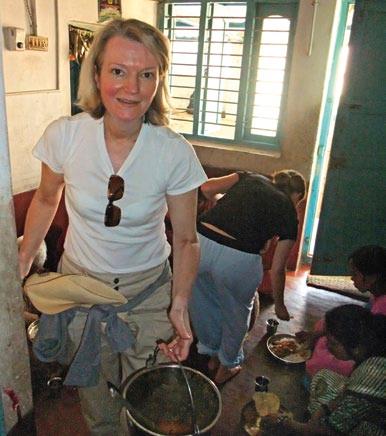
and stepping out of the car and into a sea of smiling faces, Simon saw that instead of misery there was an overwhelming sense of love and happiness. “It was just this incredible place,” he says. “The children were really affectionate and absolutely clean even though there was no running water. The women looking after them in this most horrendous environment were just amazing.”
Simon spent two unforgettable hours in the children’s presence, during which time he helped serve them a meal and listened to them sing. He left determined to help them more, if he could.
In fact, the manager of Shreyas, 45-year-old Balaji Nanabala, and his team had already been supporting the orphanage for some time. As part of the yogic lifestyle, the resort had introduced a popular activity called “community exercise”, where guests picked vegetables from the hotel’s garden, cooked meals and took them by tractor to local schools.

Then, in 2007, two British visitors asked if they could do the same at an orphanage.
Balaji hadn’t heard of any nearby, but the hotel’s naturopath Dr Sukumar Kalavara Nagaraja suggested a little place in the village of Hesaraghatta, some five miles away.
Balaji made some enquiries among the locals to check out the orphanage’s credentials. “There wasn’t a single negative response from anyone,” he says. “Everybody told me that Sarojamma, the lady who runs the place, was loving and kind, like a mother to the children.”
Least surprised about any of this was a grinning Dr Sukumar, 36, who’d been withholding the fact that he, too, had once been in Sarojamma’s care. He knew the vital part she played in the lives of these children, whose parents had died, abandoned them or simply couldn’t afford to look after them. He also knew the orphanage was struggling to pay its bills and to put food on the table. It relied on small and irregular donations from
“everyone told me that the woman who runs the place was loving and kind”
well-meaning locals and from Sarojamma taking a small cut from the work—assembling electrical and machinery spares—she found for local women.
“I’d never heard of anyone from an orphanage going on to become a doctor,” says Balaji. “When I found out, I was proud to have Dr Sukumar working for us. And I was very curious to meet this incredible lady who’d looked after him.”
At 59, Sarojamma—she only has one name—was slowing down a little by this time. Then again, she’d been looking after those less fortunate than herself for 40 years. When she met Balaji and discovered the hotel wanted to work with her, it felt, she says, “as if the Lord had heard our prayers. We’d been barely making ends meet, but we instantly sensed that they would help and support us.”
Balaji organised twice-weekly visits to cook for the children, and they proved a hit with his guests. “People seemed to feel privileged to play a part,” he says.
According to Sarojamma, the reason ►
Sarojamma: “We’d been barely making ends meet”

for the enthusiasm was the irresistible sight of the little ones who would line up to greet/mob each new arrival. “Everyone who visited us saw cheerful, confident, well-behaved kids, and they seemed affected by the energy here.”
But the orphanage itself was on the verge of falling down. “When Sarojamma showed me the leaky rooms with their uneven stone and cement floors, broken mud walls and lack of toilet facilities, I became quite emotional,” says Balaji. There was also a large hole in the roof.
Government assistance for orphanages is not exactly abundant in India—getting the authorities to recognise one, let alone fund it, is difficult, says Balaji. He dearly wanted to do something to improve the facilities himself.
“Sarojamma had been given some land [by a local friend] and kept asking if we could help with the construction of a new building,” he says. His guests had bought mattresses, clothes, cooking equipment and toys. “But though we loved supporting them, the money needed for rebuilding was beyond our imagination.”
Then Simon Binder knocked on his door. “Was our trip some kind of fundraiser?” Simon asked him straight up.
“No,” said Balaji—any donations had always been spontaneous. But he explained a bit more about Sarojamma’s plight and that he’d been quietly harbouring plans to help build her brandnew, 4,000-square-foot premises.
“I asked what kind of money he needed to get things started,” says Simon. “In Britain it would be £500,000 or a million. Then he said £20,000 and I thought, This is madness! That’s got to be affordable! I said I’d like to help—and also do something in memory of my dad.” He wrote a cheque for £5,000 on the spot and by the end of the week had encouraged another guest to contribute £3,000.
These unexpected acts of generosity opened Balaji’s eyes—others clearly shared his altruism and collectively, perhaps, they could go at least some way to rebuilding the orphanage. He went to see Sarojamma. “I told her we would extend all possible support for the construction, but cautioned her that its completion would depend on the funds that could be generated.”
All Sarojamma heard, of course, was “We’re on!” This was the day she’d been dreaming of.
But Balaji needn’t have been so cautious. Word got round Shreyas about Simon’s gesture and over the next few months 83 past and present guests donated more than £47,000—including £23,000 from a 58-year-old American visitor, Laura Brancato.

“I helped because I was able to do so,” she says. “It was one of the best decisions I have ever made.”
Balaji NanabalaWork on the new orphanage began in earnest, and was completed at the end of 2011. What emerged was a sleek modern two-storey building—far beyond original expectations. In the end, it cost £72,000,
►

“the children are proud to belong to the new orphanage”
the remainder of the money being given by generous locals, other friends of the orphanage and Shreyas itself—with many workmen helping out as a favour or for special rates.
The place is now home to 40 children. It has all the heart of the old orphanage but none of the perils. “It feels safe and secure,” says Sarojamma. “The children are happy, free and proud to belong to a place which is their own little heaven.”
“It’s better than any other residential houses around in its quality and facilities,” beams Balaji. “There are bunk beds, a computer room, a play area and more. The children were so excited when it opened. They were playing hide and seek, climbing up and down the steps, shouting from the terrace, testing the taps and the showers. We have appointed three teachers, all paid a monthly retainer by Shreyas, and our maintenance staff are always on call, free of charge. The orphanage has become a part of our lives and we are always looking for ways to improve it.”
As well as the Shreyas-funded tuition and free yoga sessions for the youngsters, the hotel has started cultural-awareness courses with them, which climaxed with
Faced with a load of weapons confiscated from Mexican drug cartels, you’d imagine the powersthat-be melting them down or selling them for scrap. But one group of musicians had a more novel idea—transforming
the orphans performing a number of folk dances at Shreyas last Christmas.
Once or twice a week, a car still rumbles through the Bangalore countryside taking guests to help with meals, to sing and dance with the children and to help with their English. It’s as popular an excursion as ever: one German guest, overcome by a desire to help, recently chose to spend four nights at the orphanage.
A kind, philosophical man, Balaji believes that if everyone directed just ten per cent of their efforts to the community, “there would be no disharmony in society”. And though Simon has only seen the new orphanage in photographs, he’s thoroughly delighted with the outcome of his initial donation.
Sarojamma’s orphans would surely agree: thanks to the hotel and its guests’ generosity, many have gone on to enjoy a successful future. A girl called Girija who made it to university now runs a Montessori school. Venkatesh and Govinda are two brothers who these days manage a fleet of taxis in Bangalore.
“What we have today is hope,” says Sarojamma. “All our apprehensions about the future of the children have been put to rest.” n

the guns into instruments and using them to perform a version of John Lennon’s “Imagine”. As a way of promoting peace, it scores highly for originality, if not for tunefulness. See
for yourself at YouTube. com (search “Imagine Concierto”).








Immerse yourself in a subject you’re really passionate about by studying for an Open University degree. We’ve courses in everything from art history and philosophy to languages and music, all designed to make your learning an enjoyable and rewarding experience. Study at your own pace, wherever and whenever you like. And get lots of support from dedicated tutors and many like-minded students you’ll meet along the way. Thousands of people have already realised their passions by studying with The Open University. Isn’t it about time you started the next great thing in you life?



how this man’s little-known berkshire firm is influencing what you buy, feel and eat— using only the power of smell
by christopher Middleton photographed by seaMus ryanWhat does the moon smell like? How come there’s a hint of mulled wine in the air in that department store woollens section? And while we’re at it, why do all the toilets in Legoland have the appealing waft of bubblegum?
The answers to these questions can be found locked away in an unremarkable-looking building on the outskirts of Maidenhead. Here, secreted inside a series of silver suitcases, are row upon row of tiny glass phials, each containing a different, but instantly identifiable, odour.
Remove one lid and the air is full of the scent of baby powder. Undo another, and it’s garlic bread. Try a third, ►

MR AROMA Hamleys toy shop is just one of the companies Christopher Pratt and ScentAir work with
and suddenly you’re in a world of suntan lotion and coconut oil.
◄ attentions to smell. “Now I’ve got a team of 12, with salesmen out on the road all the time. And the number of clients has just mushroomed.”
And that’s just the tip of the olfactory iceberg. For this is the headquarters of ScentAir, a company that has, without many people realising it, become UK Smell Central. Five years ago, the idea of “fragrancing” British stores, cafes and theme parks was almost unheard of. Now it’s big business, with “olfactory marketing” a carefully targeted retail strategy.
You thought that deliciously appealing smell in the Ikea store was the aroma of

The chosen odour is blown through the shop or hotel by machines like this

gently baking gingerbread? Sorry, it comes from an electric fan blowing across an artificially created liquid, designed in ScentAir’s laboratory to reproduce the whiff of warm cookies.
The same goes for that earthy hint of patchouli oil in the Harley-Davidson motorbike showroom. It’s coming not from the seasoned leathers of some grizzled, bandana-wearing biker, but out of a discreetly hidden plastic nozzle.
“Five years ago, I was the only employee,” recalls ScentAir founder Christopher Pratt, who trained as a town planner and spent a few years running a hot-dog company before turning his
ScentAir’s machines—which start at £100 a month for installation, servicing and refills—are present in some 3,000 UK locations. Clients include clothes shops (Mango, H&M, Juicy Couture), theme parks (Drayton Manor), furniture stores (Harveys), hotels (12 branches of Marriott), jewellers (Charles Fish, Goldsmiths, Tiffany & Co) and Hamleys toy shop. Walk round one of the huge new Westfield shopping centres and you’ll pass through anything up to half a dozen ScentAir “deployments”, as they’re called.

these bespoke bouquets come with a colourful assortment of name tags. Among some 2,000 scents, there are Green Bamboo, Pure Gardenia, White Tea and Thyme, Sierra Rain and NewMown Grass—not to mention Leather Sofa and anything in the fruit and vegetable line from Onion to Rosemary.
ScentAir won’t divulge precisely how its scientists create smells, partly
because it’s impossible to copyright a fragrance under international law. But the International Fragrance Association lists more than 3,000 substances that are used in perfume production, with names such as benzonitrile and trimethyloxazole—though scents also come from fruit and other natural sources.
The majority of businesses that employ ScentAir’s services want to lull customers into a sweet-smelling sense of security, encouraging them to spend longer on the premises and so spend
the Hard Rock Hotel in Orlando, Florida, decided to use ScentAir’s chemically created Sugar Cookie and Waffle Cone fragrance to steer customers towards their in-house ice-cream parlour, takings increased by 30 per cent.

getting the right scent for a business is a highly scientific process

more. Numerous academic studies have demonstrated the part that smell-power can play in generating income.
As long ago as 1995, a research programme in Las Vegas found that punters put 45 per cent more cash into slot machines when the room was scented with a pleasant fragrance, rather than just the odour of sweat and desperation.
Another study, carried out by neurologist Dr Alan Hirsch, director of the Smell & Taste Treatment and Research Foundation in Chicago, discovered that customers were prepared to pay £6.25 more for Nike trainers in a nicely scented shop than in an unscented one. And when
Gettin G the ri G ht scent for a business is a highly scientific process. “The first thing you’ve got to do is establish your customer profile. Then you choose the fragrances that fit it,” says Christopher. “To appeal to female customers, you’ll need odours with lots of fruity, fresh, floral notes. Male customers respond better to woody, muskier scents. And people over 40 don’t like the aroma to be too aggressive—it puts them off.
“Next, you’ve got to decide which parts of your operation you want to fragrance. Some shops just install our machines at the entrance, so customers get that distinctive waft when they enter and leave. Others use different fragrances in different sections of the shop.
“A lot of shops also like to vary their scent to fit the time of year: new-mown grass in summer, perhaps, or the smell of pine cones at Christmas.” ►
“to appeal to female customers, you need lots of fruity, fresh and floral notes”
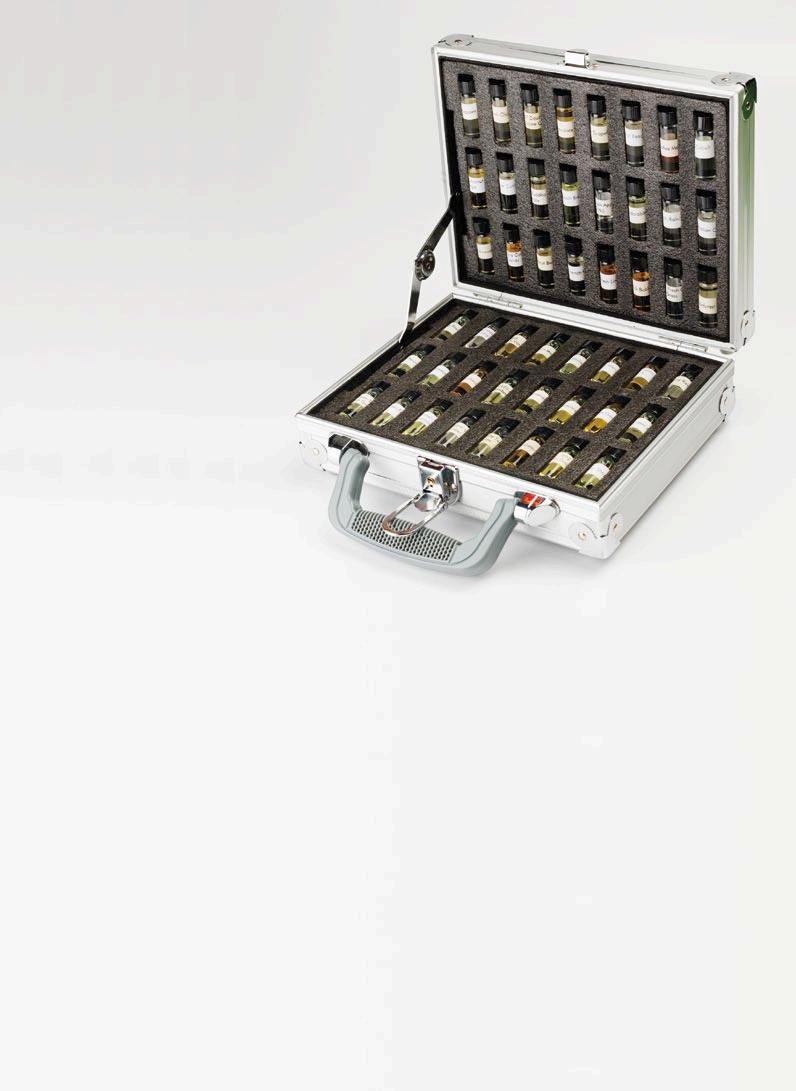
b efore prescribinG a smell, ScentAir draws up a shortlist of fragrances and conducts tastings—or, more accurately, sniffings— with clients. These are done on a blind basis, with each aroma presented in an anonymous package wrapped in silver foil. The optimum number of sniffers is two or three, as experience shows that if you ask too many people, the results get diluted.
Christopher’s team provides “neutralising” odours for businesses at basement level (nightclubs, discos, restaurants) which don’t want customers catching the unalluring smell of damp. And since Legoland UK started releasing ScentAir’s candy-like aroma into its toilets, customer questionnaires have begun to mention the loos in glowing terms.
But some clients want something on the less pleasant side of the odour world. ScentAir supplies the waft of oily machinery for HMS Belfast’s engine room; the smell of freshly dug earth for Manchester Museum’s section about the city’s foundations; and the smell of burning
These phials contain the smell of everything from baby powder to burning tar
rubber for a number of indoor go-kart tracks. It’s even installed the smoky scent of cordite in the lunar section at the Science Museum, to mirror what astronauts and scientists say is the predominant smell on the moon.
c hristopher pauses our conversation, opens a window and reaches into the bottom of a silver suitcase. “I would describe this as the notso-fragrant end of what we do. Reading from left to right, we have burning tar, bad fish, urine, vomit and faeces.”
A quick sampling of each phial confirms the accuracy of the ScentAir scientists’ work. Only once you’ve regained your senses are you in a state to put the
obvious question. Who on earth would pay good money for that?
“Well, as it happens, one of our most regular customers is the London Dungeon,” Christopher tells me, cheerfully uncorking a small but deadly test tube. “This, as far as we can tell, is what the average street in Southwark would have smelled like a few hundred years ago.”



It most definitely does what it says on the phial. No wonder most of the capital’s population used to go about with a freshly picked bunch of flowers—a nosegay— pressed up against their nostrils.
Indeed, there’s no doubting that, used properly, nose-power is the next best thing to time travel. “Nothing stimulates memory and emotion more than smell. It’s extremely deep-rooted in all of us,” says Christopher. “When I was little, I used to spend a lot of time with
my grandfather in his shedcum-workshop. The minute I catch a waft of that mixture of wood and oil, I’m transported straight back to being a five-yearold boy.”
Compared with the huge amounts of money firms spend on marketing, public relations and design, explains Christopher, the size of budget they put aside for smell is tiny.
“But at long last, they’re now starting to take the importance of odour on board. You can make a shop look a certain way with decoration, you can make a shop sound a certain way with music, and you can make a shop feel a certain way with the quality of service you offer. Put all that together, and you’ve got an A-rated store. Add an attractive fragrance, though, and in terms of appeal and customer spend, you go straight from A to A*!” n
It’s 25 years since Tim Berners-Lee developed the World Wide Web (read more on p43). In celebration, here are a few amazing facts about the power of the internet:

• The world’s first website is still online: info.cern.ch/hypertext/www/TheProject.html
• Of the seven billion people on the planet, more than 2.4 billion use the internet. Asia accounts for 1.1 billion.
• The most popular YouTube video ever is “Gangnam Style”, with 1.9 million views
• There are approximately 840 million websites—up from 65 million in 2005 and 350,000 as late as 2011.

Welcome to the pages that help make life simpler, easier and—we hope—more fun!
Back in January, punters were betting that 2014 would be the wettest year on record, and they could well be right. According to the Met Office, there’s evidence to show that it’s not only rainier (up five per cent since 1961), but that rain increasingly falls as cloudbursts.
Scientists blame it on changes in sea temperatures and the shrinking Arctic icecap. Along with a 0.5C increase in temperatures since the Sixties, this pushes more moisture

into the atmosphere, upping the chance of torrential rain.
But it’s the fickle jet stream that really plays havoc with the weather. An investigation by the Met Office found its position contributed to the big freeze of 2011, the washout summer of 2012, and 2013’s icy spring.

QI chose the wrong station when buying an advance train ticket online and the company won’t let me change it or give me a refund. Is there any way to get my money back?
AStrange but true: it can be harder to change a rail ticket than a Ryanair flight. Though it’s possible to alter dates and times, train companies won’t let you alter the route when you buy a cheap advance ticket. That applies even if you report your mistake straightaway, because the coolingoff period that lets you cancel online transactions within seven days doesn’t apply to fares.
Consumer group Passenger Focus thinks this is unjust.
“The key question is what’s causing the jet stream to shift?” says the Met’s Professor Stephen Belcher, who reckons that climate change may give it a crucial nudge. And as for this month, all bets are off. Last March was one of the coldest on record, although the year before temperatures soared to record highs. The only consistent factor is that weather’s becoming more extreme, so be prepared. A waterproof triclimate jacket might be your best buy this year. ►

“Got your dog ticket, miss!”
“People should have a chance to check that they’ve bought the right ticket,” says spokesman Dervish Mertcan. It’s campaigning for a change in the law, but at present you’re reliant on the company’s goodwill. Put your case politely but firmly, stressing that you made a genuine mistake, and if you get nowhere write to the chief executive by name. If you bought the ticket direct from the operator, not a third party such as thetrainline.com, you may get lucky.
Whatever you do, don’t be tempted to get on the train with the wrong ticket. “Unusually, train companies have the right to prosecute you directly,” warns Passenger Focus. If you’re caught and refuse to pay the full fare, you could end up with a criminal record.

It’s how persuasive we are, not how deserving, that counts, says business mentor Heather Jackson, founder of management think tank An Inspirational Journey. “Don’t assume that the hierarchy knows about you,” she warns. “If you don’t want to be judged by your job spec, it’s vital to highlight your strengths.”
strength 1: self-belief
“Talent is hard to come by, so never feel you should be grateful for a job,” says Jackson. If you have skills and loyalty to offer, you’re an asset to the firm.
strength 2: A business case
Companies aren’t charities, so don’t expect a rise because you’ve been there
for years or a colleague has wangled one. “Focus on telling them what you’ve delivered for the organisation and what you can do for it in future,” says Jackson.
strength 3: networking
Find a mentor to inspire you and influence decision-makers. But make sure your line manager knows what you want too, so they don’t think you’re being sneaky.
strength 4: Tactical nous
Wait for a more relaxed time in the work cycle, then ask your manager if you can discuss your career for ten minutes over coffee. Planning is essential at every stage, so don’t waltz into a meeting hoping to “see how it goes”. “You need preparation

and excellent presentation to sell yourself and your achievements,” says Jackson. strength 5: An exit strategy
If the firm can’t afford to pay you more, consider asking for a salary review in six months, flexible working or a new title. If they offer less than you’d like, take time to think it over. “Say, ‘Thanks, can I get back to you?’ ” advises Jackson. But don’t threaten to hand in your notice unless you have a job offer in your pocket. They might just accept it.
Embarrassing selfies, dubious jokes and potentially libellous tweets—stress caused by social networking is one 21st-century problem that’s bound to increase. So thank heavens for Snapchat, the vanishing-photo app that makes words and pictures available for just 12 seconds before—pouf!— they disappear.
Most users currently belong to tech-savvy Generation Y (the average age is 18), who’ve seen their elders caught out by unwise internet posts. But it also appeals to anyone who wants to share shots of meals or flying cats that no one wants to keep.
Snapchat isn’t 100 per cent secure, as users whose contact details were hacked discovered earlier this year. There’s also nothing to stop recipients taking a screenshot of the pic before it vanishes, so sexting is not a good idea (was it ever?). And maybe you’d like friends to hang onto your pics—in which case, Instagram Direct, which restricts access to people you list, could be the answer.


■ Always check shipping before shopping and surf voucher sites for offers of free delivery. If the price of the goods plus the cheapest delivery option is more than you’d pay on the high street, think again.
■ Try click and collect. John Lewis customers can often collect from Waitrose, Boots will deliver to any branch (minimum spend £20) and Tesco buys can be picked up from Tesco Express—all for free. Many e-tailers deliver to Collect+ points in local shopping parades and post offices, but there’s often a charge.
■ If you’re placing a large order, call customer services. It’s often possible to negotiate free delivery, especially if you’re dealing with an independent firm.
■ It may be cheaper to opt for another address. Deliveries to “remote” areas (such as the Isle of Wight and Inverness) can cost double, so try sending goods to friends and family elsewhere. If you live in Northern Ireland, you may do better to buy from suppliers in the Republic.
■ Accept a trial of Amazon Prime for free next-day delivery, making a note to cancel within 30 days to avoid the £49 annual charge.
● Flowers by mail can make my heart ache. Beautiful as they are, they mean you won’t be coming over on Mother’s Day, and seeing you walk through the door lights up my life.
● your home’s a mess. That’s the real reason I keep offering to wash up and surreptitiously tidy your house.
● I never stop worrying about you. You may be 50 and a high-flier, but if you seem stressed or depressed I’ll fret about it all night.
● no one likes being made redundant. I’m glad you have a partner and a family. But now you have a home of your own, I’ve lost my role in your life.
● I’m so proud of you. I tell everyone how clever, successful and caring you are. Everyone except you, that is.
● It wouldn’t hurt to say thanks. Of course I’ll babysit, give you a lift or lend you money until payday, but I get upset when you take me for granted. And I need to know you received the present I sent, so I can stop fretting that it’s gone astray.
● I have had sex, you know. I’m not easily shocked, so don’t ever feel you can’t confide in me.
● sometimes I do know best. I may not understand Twitter
and it takes me for ever to text, but I’m a whizz at budgeting, gardening and, dare I say, bringing up kids.
● I’m not olga Polizzi. I’m not a hotel inspector and I don’t expect home-baked cookies or immaculately ironed sheets when I come over to your home. It’s you I’ve come to see.
● My life has been rich and complicated. If I were a friend, you’d find me fascinating.
Sometimes I feel sad that you can’t see there’s more to me than being a mum.
● I wish we were closer, and I’m not talking about where
you live. There’s a distance between us that’s nothing to do with geography.
● …but I like having the house to myself. Although I miss you, it’s nice to know that there’s food in the fridge and my car seat is as I left it.
● when are you going to have kids? I’m longing to know, but it’s the one question I dare not ask.
● Can I ask if you screen my calls? When you don’t pick up, I’m scared that you’re secretly saying, “Damn!”
● I don’t want to be your Facebook friend. Watching And I really don’t want it to be

can’t help the way my face softens when I speak to
out of my way to treat you all the

One unexpected benefit of being a doctor is that—just because you have the title “Dr” in front of your name—scary people are nice to you. Once they become patients, even the roughest, meanest people go out of their way to be pleasant and courteous.
There are, of course, exceptions, and I’ve had to call security for a few difficult patients who’ve decided that the best way to get my attention is to try to punch me in the face.
Unfortunately, hospital security is rather difficult to get hold of when you want it. If you park your car outside a marked bay, they descend en masse. When you’re being held against the wall by a huge drunk man, they’re nowhere to be found.
In these situations it’s usually best to call for a nurse instead. Nurses take abuse on a daily basis and are therefore fantastic at dealing with it. I’ve seen nurses half my size tackle men twice as big as me without even breaking sweat. They’re also the ones—not the doctors—who know what’s really happening on the wards. It’s still the doctors whom most patients respect. Without the
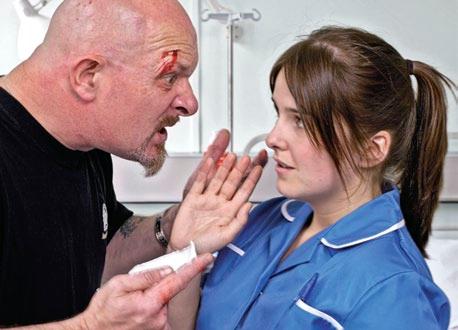
Without the nurses the whole thing would fall apart
nurses, though, the whole thing would fall apart.
Countless times it’s the nurse who whispers the answers to the junior doctor when the consultant asks questions on the ward round—or who stands there silently while another doctor takes the credit for something they’ve done. It’s the nurses who deal with the patients day in, day out. Yet they don’t receive a fraction of the respect they deserve—not from patients and certainly not from doctors.
Even so, it pays to be nice to nurses. Not only do they know where everything is and how it works; but if they like you, they’ll
make you tea. One nurse, Andrea, even makes me sandwiches when I work night shifts.
A few weeks ago, walking through A&E, I suddenly found myself cornered by Mr Ellis. He wasn’t happy. He’d got into a fight earlier that evening and suffered a head injury. Because he was still very drunk, and aggressive, he’d been left to calm down for a while.
“I’ve been waiting hours. I want someone to see me now,” he shouted as he pushed his face into mine. I tried to placate him, but he got more and more irate and grabbed me by the tie. Then Andrea appeared. She’s only just five feet, but she took him firmly by the hand. “How dare you behave like that to one of the doctors,” she barked and marched him off.
Twenty minutes later she returned. “I think he’s calmed down enough now for you to see him,” she said.
Mr Ellis was sitting sedately in a cubicle. “Sorry doctor, didn’t mean to be rude. Just don’t like hospitals and was getting myself worked up.” Amazed at the transformation, I assessed him. As I was about to leave he leaned forward: “Say thanks to that nurse for me, won’t you. She was cool. Respect is due.” I couldn’t agree more.
Max Pemberton is a hospital doctor and author. He’s also the resident doctor on ITV’s This Morning
If you don’t open your bowels daily, don’t worry. Fewer than 50 per cent of people do, and it doesn’t mean anything is wrong. To diagnose constipation, doctors generally look for at least two of the following problems for three months of the year: hard, pebble-like stools making up at least a quarter of your motion; the need to evacuate manually; straining to pass a motion; a feeling that you haven’t emptied your bowels; fewer than three stools a week.
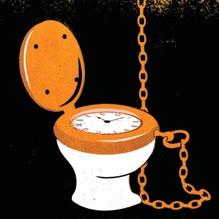
Where did the myth come from?
No one knows exactly—but some argue that it’s been perpetuated by doctors, many of whom wrongly believe a daily bowel motion to be ideal.
so there’s nothing to Worry about?
Ninety-five per cent of adults have bowel movements between three times a day and once every three days. The entire range is normal. The key is that you’re regular. Drink plenty of fluids, exercise, eat a diet rich in fibre—and this should ensure your bowels are working properly, regardless of the frequency. However, a sudden change in frequency either way can, rarely, indicate a problem and in those instances, it’s best to go and see a doctor. ■










If your days out are being ruined by too many visits to the toilet you may be su ering from an overactive bladder.
Over 7 million people in the UK su er too, so you’re not alone.
Luckily there are treatment options available including e ective medications from your doctor.
To find out more about overactive bladder and the help available visit
www.bladderproblem.co.uk
Or call our free helpline on 0800 011
4766













Around 7,000 women a year are diagnosed with ovarian cancer in the UK. Unfortunately, there’s no screening available, the symptoms are non-specific, and the disease is often missed until it’s too late.
But there is hope. A 2013 study in Gynecologic Oncology was the first to find a link

Ovarian cancer can be hard to detect
which produce proteins that help repair DNA. Here’s what you can ask your doctor about: l Research suggests that the most common—and most deadly—type of ovarian cancer is generated in the Fallopian tubes. Removing them during a hysterectomy is an option for women at greater risk.
Up to ten per cent of cases are thought to be hereditary, and the figure might even be higher. It’s now common knowledge that women carrying BRCA1 or BRCA2 mutations are at a greater risk of breast cancer—actress Angelina Jolie had a double mastectomy after finding out she was a carrier. Less well known is that they can also increase your chances of ovarian cancer.
Women with a BRCA1 mutation have a 40 per cent higher risk, while women with BRCA2 mutation have a 16 per cent chance of ovarian cancer. Genetic testing —available if you have a family history of breast cancer— can help to determine if you have one of these gene mutations.
We hear a lot about prostate cancer, but there’s another painful yet benign condition that affects up to half of all men at some point in their lives: prostatitis or inflammation of the prostate. Yet for something that’s so common, prostatitis is amazingly misunderstood.
For a start, it isn’t just one condition but a variety of problems affecting the pelvic area. Symptoms are pelvic pain (or even pain in the testicles), painful ejaculation and trouble urinating. The causes include trauma to tissues around the prostate, urinary-tract infections and STIs. It can also be affected by other conditions such as irritable bowel syndrome and depression. Often, in fact, the prostate is not involved at all,

and some doctors now refer to prostatitis as chronic pelvic pain syndrome.
If any of those symptoms sound familiar, it’s important not to be shy—see a doctor at the first sign of a problem. Letting symptoms drag on for months can make it harder to cure. The pelvic floor becomes hypersensitive, and the patient still has pain even after successful treatment.

So what is the treatment? The answer is that it depends on the cause of the problem. Antibiotics, antiinflammatories and alpha-blockers (which relax the muscles around the bladder and improve the ability to pee) are all weapons in the pharmaceutical armoury. Cognitive behavioural therapy or physio are other possibilities. Controlling stress can also help—as can avoiding certain food triggers such as caffeine, alcohol and spicy or acidic foods.
It’s No Smoking Day on March 12 and we’ve discovered another good reason to give up the fags (and lose weight at the same time). According to Belgian research, smoking and obesity can both cause permanent and significant damage to your hearing. An increase in the flow of blood to your inner ear weakens the hair cells that transmit sound to your brain.
This is backed up by a similar study in the BMJ’s Tobacco Control journal, in which more than 4,000 people aged 53–67 were asked about their lifestyle and where they worked, and given a hearing test. The smokers struggled to pick out high-frequency sounds. TOp
You can take a simple hearing test by going to the website actionon hearingloss. org.uk—or by calling Action on Hearing Loss on 0844
800 3838.

At Bimuno® we understand that when you want to get on with your life, good digestive health is important.
Live life on your terms with Bimuno IBAID, a unique patented formulation, specially developed by international experts in digestive health.
Published scientific studies* have shown that some prebiotic Galacto-oligosaccharides, such as those provided by Bimuno, can help encourage and sustain a healthy level of your beneficial ‘good’ gut bacteria, helping you to maintain your intestinal comfort.
Try Bimuno IBAID soft chewy pastilles and feel the difference for yourself. Visit bimuno.com for more information.
Find us on or follow us on
Available from
*Studies on file. Bimuno IBAID is the result of nine years of intensive scientific research with the University of Reading. Bimuno is a food supplement. Food supplements are intended to supplement your diet and should not be regarded as a substitute for a varied diet and a healthy lifestyle. Bimuno® is a registered trademark which is the property of Clasado Inc for a Prebiotic Transgalactooligosaccharide.

it’s very easy to eat too much salt, which can contribute to high blood pressure. The recommended daily maximum is 6g, so make sure you check food labels. And why risk your health shaking extra salt on your food when you can boost it by using spices instead? Here are four of the best...
CoriAnDer portuguese researchers studied the ability of coriander-seed oil to destroy bacteria, including E. coli and salmonella. They found it kills them by damaging their cell membranes.

Cumin Many spices are noted for their high levels of antioxidants, which some believe can help neutralise free radicals, the cause of many diseases, including cancer. The OrAC value is a measure of antioxidants in 100g—for cumin seed it’s 50,372. That’s way more than a glass of healthy Cabernet Sauvignon, which clocks up 4,523. TurmeriC packs an even bigger antioxidant punch. Its OrAC value is 127,068! research from the University of Michigan Comprehensive Cancer Centre also suggests that curcumin, the pigment that gives turmeric its colour, might also help prevent breast cancer.
BlACK pepper

Keeping your food cupboard up to date saves valuable time when it comes to preparing healthy, tasty meals. Follow our four-step plan:


Your humble pepper mill contains a veritable super spice. Studies show that piperine, which provides black pepper’s flavour, may not only help prevent breast cancer but also block formation of fat cells, making it a potentially powerful weapon in the fight against obesity.
are in good nick and the cans aren’t dented.
Step 1: Chuck. If you haven’t used a food item within a year, bin it— especially anything that’s expired. Move foods near their use-by date to the front to remind you to use them first.
Step 2: Donate. Give any non-perishable items you don’t want to a food bank. Make sure they haven’t expired, the packages
Step 3: Stock up. Make whole grains your larder’s equivalent of the “little black dress”. They are the basics for a nutritious meal. Experiment with different types, such as quinoa and barley. Once opened, whole grains should be stored in an airtight container.
Step 4: Accessorise. Keep a good selection of herbs and spices to give any basic dish an instant pick-me-up. (See our choice of the best spices above.) n
Check





Never take your heart for granted. It’s perhaps the hardest-working organ in the body, beating an estimated 2.5 billion times in the average lifetime.
As you get older, supporting the health of your heart is even more important. You may wish to consider taking a nutritional supplement such as Vitabiotics Cardioace, to help safeguard your daily nutritional intake.
Take steps towards a healthy heart. Regular exercise pays off, and you’ll find it easier to stick to a fitness routine by doing something you really enjoy – whether that’s a brisk walk, going for a bike ride with friends, or dancing the tango.
Laugh out loud. Studies have shown the health benefits of laughter. Follow a heart-healthy diet, full of protective nutrients. Boost your antioxidant intake: spinach, carrots, watercress and broccoli contain beta carotene, while seeds, avocados, wheatgerm and nuts are rich in vitamin E. Soluble fibre in
oats, bran, fruit and vegetables helps reduce cholesterol levels. Cut salt and processed foods. Read food labels carefully to check for high saturated fats, salt and sugar content.
Vitabiotics Cardioace contains vitamin B1, which contributes to the normal function of the heart, with vitamins B6, B12 and folic acid also contributing to the maintenance of normal red blood cell formation. Cardioace also provides Garlic Extract. A general vitamin and mineral supplement is not required in addition to Cardioace. Remember, supplementation must never replace a healthy diet and lifestyle.

Vitabiotics Cardioace RRP £7.45 for 30 tablets (a month’s supply). Available from Boots, supermarkets, pharmacies, health food stores and online at www.cardioace.com

QMy family of four had a baggage allowance of two bags per person, but while collectively our weight allowance was under the limit, the airline wanted to charge us per person. Is this fair?

A Baggage allowances are a constant source of frustration for travellers, and none more so than the division of baggage allowances for a family. There was a time when a friendly smile and a knowing look might have saved you from a penalty, but not now when there’s little wriggle room given to the desk staff. Airline travel has gone budget almost right across the board, so if you want ease of passage you have to pay for it and you have to plan in advance. You need to weigh your luggage before the flight and, if you’re with your family, you have to learn to share that weight around before you get to the airport. Sad but true.
QI put some of my finest smalls into a hotel laundry and they’ve come back shrunk and the wrong colour. The Austrian hotel told me that they were laundered by an outside company and it was at my own risk. What can I do?
A
As a rule, one should be cautious about putting good quality
fA st tip
Travelling abroad and want your usual TV fix? You can arrange to have foreign access to your favourite shows through Netflix and Sky, but beware websites offering you alternative IP addresses back in the UK because you may be receiving illegal content.
clothes into a hotel laundry, unless it has a good reputation or you’ve had previous experience there. As a guest, you may have signed a waiver, but even if you did you still can chase it up with the hotel management or its international head office, if it’s part of a chain. There’s also a facility to chase up consumer concerns across the European Union even when you get home. You should contact the UK European Consumer Centre (www.ukecc.net) and they’ll help you fight your case, so don’t despair. But remember to be very careful with your smalls next time—perhaps you should take a good supply to avoid potential laundry damage. ■
Donal MacIntyre is an investigative journalist and a former presenter of ITV’s London Tonight. Please email consumer queries to Donal: excerpts@readersdigest.co.uk


The Park Life Group have a wide variety of modern homes in beautiful locations across the country. So why not downsize, release capital and make the most of your leisure time in 2014. You could move to a stunning location and have a new detached home with a high-spec interior, that’s a delight to live in and easy to maintain. Its simpler than you think with The Park Life Group - with over 50 parks across 17 counties. People from all walks of life choose to live in a park home, or buy one as a second home, and become part of a friendly community. With almost 70 years of excellence, The Park Life Group offers remarkable value for money and superb customer service. Call us today for more details on our stunning homes and development plots available across the country or visit our website www.parklifegroup.com

A Two Bedroom Omar Sandringham

Part Exchange Example: Part Exchange Available: Solicitor and Agents fees paid.

Park Home Price: £129,950
House Price: £200,000
Cash to you: £70,050

Open weekends:
Wickham Court - 22 & 23 FEB
Fareham, Hampshire PO17 6JS
Truro Heights - 22 & 23 FEB
Kenwyn Hill, Truro, TR1 3DY
Tregatillian Park - 22 & 23 FEB
St Columb Major, TR9 6JL
Cheltenham Spa Parks - 1 & 2 MAR
Bamfurlong Lane, Staverton, GL51 6TD
Cotswold Manor - 1 & 2 MAR
Stratford Bridge, Ripple, GL20 6HE
Regency Court - 1 & 2 MAR
Rochester, Kent, ME3 9TD
Waterbeach Court - 1 & 2 MAR
Denny End Road, Waterbeach CB25 9PF
Takeley Park - 1 & 2 MAR
Takeley Park, Takeley, CM22 6TD
Folly Park - 8 & 9 MAR
Clapham, Bedfordshire MK41 6AL
Peppercorn Park - 8 & 9 MAR
Clapham, Bedfordshire MK41 6HB
Radwell Court - 8 & 9 MAR
Radwell, Bedfordshire, MK43 7HS
Rymer Court - 8 & 9 MAR
Barnham, Nr Bury St Edmunds IP24 2PY
Westgate Park - 15 & 16 MAR
Westgate, Sleaford, NG34 7QP
Grosvenor Park - 15 & 16 MAR
Ripon, Yorkshire, HG4 1UF
Hedge Barton Park - 15 & 16 MAR
Fordcombe, Tunbridge Wells, Kent TN3 0SL
Thornlea Court - 15 & 16 MAR
Littlehampton, West Sussex BN17 7QD
Kingsmead Park- 15 & 16 MAR
Binbrook, Lincolnshire, LN8 6HS



“It’s going to cost money to get that crack repaired— how are our investments doing?”
Ever fancied playing the stock market— but never been sure exactly how to do it? Our new monthly guide has all the answers you need
Make sure you have enough cash in a savings account. Before investing in anything, check that you have enough savings to cover you for six months in case it all goes pear-shaped. Your investments are for the long term and any products you invest in, including the stock market, tend to be quite volatile in the short term. If you suddenly needed money—perhaps to pay your mortgage and other bills if you lost your job—you might find your investments at a low point just when you need that cash. So it’s important to have money you can easily get your hands on.
Make sure you’re happy to leave your money tied up for at least five years. The big difference between saving and investing is the amount of time you have your money tied up for. Saving is for the short term—to pay for things like a holiday, Christmas, a deposit on a house or emergency repairs. Investing is for your retirement, your children’s education and other long-term plans.
Investment products that give a good return can be up one year and down the next—but over a longer period (ideally ten years or more) you should have a net gain.
Start with funds. There are two main ways to invest in stocks and shares (or “equities” as they’re also known). One is to buy shares in individual companies. The other is to invest in funds, which are collections of shares in various companies, with a small amount of your money put into each according to how the fund is weighted. Although you can cartoon by rob murray
make a lot of money from individual shares, it’s very risky and takes a lot of effort and knowledge to do properly. For the new investor, funds are generally safer and easier.
There are also two basic types of funds: managed funds and passive or index-tracking funds. The former are run by fund managers who pick and choose the companies. The latter are run by computers that essentially track a stock-market index, such as the FTSE 100, by investing a certain amount in every single company in that index. Interestingly, although managed funds tend to charge higher fees (as people cost more than computers), the majority of them underperform.
Pick a UK-based fund. If you haven’t bought stocks and shares before, it’s probably best to start with UK investments and move on to other countries or particular sectors—technology or media, say—later. Happily, most big investment houses do offer UK-based funds. Fidelity, Scottish Widows, Virgin, Edinburgh and M&G all have index-tracking funds invested in the FTSE 100 (the top 100 companies) and FTSE All Share (a far bigger range).
Do it in an ISA. You can invest up to £11,520 in stocks and shares within an ISA wrapper. (It goes up to £11,880 next month.) Or you could put half that amount in a cash ISA and the other half in a stocks-and-shares ISA. It’s definitely worth wrapping as much of your equity investments as possible in an ISA because you save so much in tax.
Get 10% off one of the delightful gifts at elliottrose.com with our exclusive voucher code. Just type in “elliottrose” when you’re at the checkout and you’ll get a discount on their bath gift-boxes full of bath “cupcakes”, candles, tea accessories or even socks. Prices start from £6.99. Offer lasts until March 20, 2014.

make money on your savings
Savers have had it tough since the crash and at the moment it’s almost impossible to get a decent return on cash deposits. Fortunately, even apart from the stock market, there are ways to make your money work harder.
Bonds. Corporate bonds give a fixed rate of interest for a given length of time. The rate is usually higher than for savings accounts, but bonds are a bit riskier. (By the way, don’t confuse corporate bonds with savings bonds, which are just fixed-interest savings accounts.) Basically, bonds are loans you make to companies— although most people don’t lend to a specific company, but put their money into a corporatebond fund instead. It’s best to start with funds that lend to big, blue-chip companies. They might not give the highest returns but they tend to be the safest.
Gilts. These are bonds issued by the Government and pay a fixed rate of interest twice a year, returning your capital when they mature. Gilt yields are now very low but the Treasury has never defaulted on its bonds so a small holding can be helpful if you want to be sure of a set amount each year. If you place your investments inside an ISA
wrapper, your returns are free of income and capital gains tax.
Property. Buy-to-let can give you a good income but there are big downsides. The mortgage rates are high; you’ll need a decent amount of cash for the deposit; and there’s the management and repairs to consider. Still, if you’re happy to play the landlord, rents are at record highs in some parts of the country.
Current accounts. Don’t dismiss the humble current account— some offer far higher rates than standard savings accounts. You earn 5% on balances up to £2,500 with Nationwide’s FlexDirect account, for example, and the Santander 123 pays interest from 1 to 3% on balances from £1,000, as well as cashback of up to 3% on various bills.
(There’s a monthly fee of £2.)
Social lending. Peer-to-peer (P2P) lending is fast becoming a popular alternative to the banks. Online platforms such as Rate Setter.com and fundingcircle.com enable you to earn varying levels of interest depending on how much risk you’re willing to take and how long you lend for. You could get average returns of 4.6% over five years. The best companies have safety funds to protect against bad debt, but ultimately, your money is not covered by the Financial Services Compensation Scheme. So be aware that in the worst-case scenario, the platform could go bust, taking your money with it.
1. Avoid traffic and save on petrol. Always check on PetrolPrices.com before you to fill up. It compares 11,000 petrol stations to find the cheapest one in your area. Just type in your postcode or town and it does the rest. Or, if you’re into apps, download Waze, a smart community-based traffic app which allows you to join forces with other drivers nearby. They share traffic info so you don’t waste time and money in jams—and also report petrol-pump prices so you can avoid paying through the nose.
2. Fill your empty seats. If you’re driving somewhere, you could get some money back by giving someone a lift. Use the car-sharing site BlaBlaCar.com to find paying passengers going your way. By taking two passengers you can save 88% of fuel costs on long-distance journeys. In fact you could even ditch your car altogether and become a regular passenger through BlaBlaCar instead.

3. Drive smartly. The Energy Saving Trust estimates the average UK driver could save more than £300 a year just by being more clever with their driving. Basic tips include driving at no more than 70mph, closing your windows when going more than 60mph, unloading unnecessary items from your boot and switching off your engine when stationary for more than a minute. Check your tyre pressure regularly too, as that can affect driving efficiency.
4. Get a better deal on your insurance. Another good move is to get cheaper insurance via comparison websites such as GoCompare.com,
CompareTheMarket.com or Confused.com—it’s a good idea to look on more than one as they often have different deals. Don’t forget that Aviva and DirectLine offers are not available there, so it’s worth checking them separately. Also, don’t assume that third-party cover will always be the cheapest option. Fully comprehensive policies can be cheaper, as they may lower your risk profile.
5. Park for less. Find cheaper parking at ParkatmyHouse.com and Parklet.co.uk, where you can park in people’s driveways for much less than commercial spaces. For example, a week’s public parking near Heathrow airport costs between £70 and £120. Renting a private space through ParkatmyHouse can be as little as £20.
6. Get money back on your parking tickets. If you’ve had a parking ticket and you don’t think it’s fair, then appeal. You have a good chance of getting your money back. Figures from the Traffic Penalty Tribunal show that more than 60% of appeals result in a win for the motorist. According to PATROL (Parking and Traffic Regulations outside London), if the information in the Penalty Charge Notice is wrong or incomplete it is invalid. This could include the reason for the ticket or the size of the fine.
the one thing you must do this month...

...is grab a weekend break. As Easter, and school holidays, are late this year, there are good holiday offers in March. Try Laterooms for last-minute deals on hotel rooms or look at Travelzoo for last-minute package deals. Or get together with friends and hire a cottage from Country Cottages or Rural Retreats. It will be cheaper if you share the cost of a single property. Even if you have no spare money for a break, organise a house-swap so that your accommodation is free. Homeexchange.com and Lovehomeswap.com are worth joining to get cheap holidays in the UK and abroad.
7. Get a black box. This is ideal for cutting the cost of motoring by younger drivers particularly. Figures show that one in five young drivers has an accident within their first 12 months of being on the roads. So it’s no wonder insurers bump up costs. If you’re a safe driver, though, a black box will help. It tracks and monitors your driving—and then feeds the information about your speed, cornering, braking and acceleration to your insurer who will base premiums on your driving ability. The AA claims it can reduce premiums by as much as 40%.
OPTIONS: This is a type of contract that offers the buyer the right—but not the obligation —to buy or sell a share or other financial product at an agreed price during a certain period of time or on a specific date. So effectively you buy a promise for later. ■
Jasmine Birtles is a personal finance writer and the founder of moneymagpie.com


As you approach retirement age you’d expect to be looking forward to relaxing and enjoying yourself, yet the rising cost of living coupled with low rates on savings mean it can be hard to make ends meet. Life can be even more difficult for those who have debts following them into retirement.
Yet it’s not all financial doom and gloom for hard-pressed retirees. For many homeowners a sensible financial solution lies at their very front door – in the form of their house.
An increasing number of people aged 55–95 are boosting their financial situation by using their home to generate extra cash, and so could you.
With an equity release plan you can get your hands on the cash tied up in your bricks and mortar to spend however you like – and carry on living in your home. You can either do this with a cash lump sum or by drawing down smaller amounts as and when you need them.
There is no requirement to make any monthly repayments while you are alive, as interest rolls up and the amount you owe is paid back when your house is sold –usually when you die or move into long-term care. Any money left over from the sale can be left to your next of kin.
Put simply, equity release makes use of the largest asset that many over 55s have at their disposal –their home.
➜ Home and/or garden improvements
➜ Go on holiday
➜ Pay debts (eg, loans, credit cards)
➜ Treat family and friends
➜ Clear outstanding mortgage
➜ Help with regular bills



Reader’s Digest has partnered with equity release specialists
Equity Release Assured to give you all the information you need to help you find out if it could be right for you. Your adviser will explain to you – using straightforward language – the benefits of equity release. They will also explain how equity release will reduce the value of your estate and may affect your entitlement to state benefits.





Request your FREE guide to equity release or arrange a free no-obligation consultation by calling FREEPHONE 0808 252 9759 today! Or visit readersdigest.co.uk/equity-release to calculate how much you could release. (We’re here Mon–Fri 9am–5.30pm.)
This is an equity release plan. To understand the features and risks, ask for a personalised illustration. Unless you decide to go ahead, Equity Release Assured’s service is completely free of charge, as our typical advice fee of 1.5% of the amount released would only be payable on completion of a plan. Think carefully before securing other debts against your home. Key Retirement Solutions Full Year Market Report 2013
Ordinary casseroles can take a while to prepare, but this speedy variation on a classic is far easier. Instead of flageolet and cannellini beans, you can use kidney, pinto or butter if you have them to hand. Or try replacing one can of beans with 225g of frozen sweetcorn.
1. cut the sausages into 2.5cm pieces with kitchen scissors and dice the bacon. Heat the oil in a large flameproof casserole and add the sausages and bacon. Fry them over a moderate-tohigh heat for 8 mins, turning until the sausages are golden.
2. Meanwhile, halve, peel and slice the onion. Peel and crush the garlic. Rinse and drain the beans; you don’t have to keep them separate.
8 large, lean pork sausages
125g rindless smoked bacon
1tbs corn oil
1 large onion
2 cloves garlic
400g canned flageolet beans
400g canned cannellini beans
400g canned chopped tomatoes
1–2tsp dried mixed herbs
1tbs wholegrain mustard
3tbs tomato purée
salt and black pepper
3. Remove the sausages and bacon from the casserole, drain on kitchen paper and set aside. Pour out all but 2tbs of fat from the casserole. add the onion and garlic and cook over a moderate heat for 5 mins, until softened.
4. stir the tomatoes and their juice into the onion and add the herbs, mustard and tomato purée. Rinse out the tomato can with ⅓ of a can
of water and add it to the mixture. Bring to the boil, stirring, then add the drained beans.
5. Return the sausages and bacon to the casserole and season to taste. Reduce the heat, cover and cook gently for 10 mins, or until the sausages are cooked through. serve the cassoulet with a green salad and mashed potatoes, or some warm, crusty bread. ■




















www.kitchen-magic.com We have a choice of over 400 styles and colours. We also offer a wide range of high quality accessories, including worktops, sinks, taps and brand name appliances to complement and complete that fresh new look kitchen of your dreams.















QA friend informs me that I need to be planning my biennials already for next spring. Where do I start?
A Forget-me-nots, wallflowers, sweet williams and foxgloves all need plenty of growth this season so they overwinter outdoors successfully and flower prolifically next year. Sow them outdoors in drills in a nursery bed or vacant piece of ground during late spring. Ensure that they’re in
a bed that will get plenty of light. Cover the bed with netting if you think that birds, squirrels or cats are likely to damage the emerging plants.
When the seedlings are large enough to handle, thin to about 5cm apart. About two weeks later, thin them again, this time ensuring that smaller varieties are spaced 10cm apart and larger ones 15cm apart. Water as needed and feed once or twice in summer. In autumn, lift plants with a trowel and transfer them to the beds or containers where they are to flower next spring.
Q I was thinking of applying a water-retaining mulch to my perennial border this month. How do I prepare?
A It’s very important that you remove perennial weeds such as tap-rooted dandelions and thistles before applying your mulch. Also, to encourage strong growth, cut out any dead and untidy stems from grasses and perennials.
Q Grass clippings have built up on my lawn over the past year and formed a springy
AThis layer, or “thatch”, often goes unnoticed, but clippings can mount up even when a collecting box is used, along with fragments of moss. Scarifying, or raking, is the equivalent of giving an old lawn a good scrub and brush up. Use a wire rake to drag out all the thatch, dead grass and dead moss. For large lawns, a powered scarifier simplifies this job.
Once the debris is removed, air circulates more freely around the grass blades and water can penetrate to the roots. But don’t scarify a new lawn, even one that’s been turfed, because the action will cause damage.
QI know that bulbs can be weakened if their leaves are removed too early. Can you give me a rough timetable?
A Leaves act as a bulb’s food factory. Early removal can prevent flowering the following year and, over several years, bulbs will die if foliage is tidied excessively. Foliage shouldn’t be knotted or cut off until it starts to yellow, about six weeks after flowering. If dying foliage spoils the appearance of a border, sprinkle seeds of a fast-growing annual, such as nigella, around the leaves to hide them.
Submit your gardening questions at readersdigest.co.uk/contact-us layer of dead material. How do I get rid of it?

l Feed bulbs naturalised in lawns and those in pots and borders after flowering.
l Weed, feed and mulch established plants. Cut off any remaining dead growth and tidy up evergreens.
l Sow tender bedding plants and other half-hardy annuals under glass early in the month. Include plants such as nemesias, impatiens, petunias, nicotianas, gazanias and mesembryanthemums.



We get through a lot of nuts, but instead of putting the shells on the compost heap, I scatter them around the tops of my potted plants. It looks attractive and protects from slugs and snails. ■ Many thanks to Carole Gasan of Gloucestershire for sending this in.
Send us your gardening tips—with photos, if possible. Go to readersdigest.co.uk/contact-us. We’ll pay £50 if we use them on this page.










Plans for all your dreams within your ISA allowance
Did you know you can invest up to £11,520 this tax year in a Stocks & Shares ISA, less any amount you have paid into your Cash ISA?
Starting from just £10 a month, My Prosperity (ISA) is an affordable way to invest for your future goals.
When you set up My Prosperity (ISA) your money is invested in an individual policy, which sits within your Scottish Friendly ISA.
Whether your dream is a trip of a lifetime, a fund for retirement or putting down a deposit for a family home, you can set up a policy for each of your goals, all within your ISA.
Stock market investments can go down as well as up and you could get back less than you invested.






www.scottishfriendly.co.uk/digest
When you start investing we’ll send you a £25 My Rewards card which can be redeemed for gift cards at over 70 UK retailers.
My Rewards



You might have seen Nissan’s designs for a new London taxi unveiled recently. The announcement and reaction were huge. This isn’t just another update to our country’s transport. It’s a major change to a cultural icon that helps to define the UK. But where did the black cab come from?
The London taxi is technically classified as a hackney carriage and dates all the way back to the 17th century. Named after the village outside London (now an inner borough) famed for its horses, the first hackney carriage ran in 1621. The first official licence was given in 1662.
From horse-drawn to motorised, from open luggage bay to closed cab, from curves to angular and back again, what we

feel to be immutable has actually always been evolving. The last horse-drawn hackney carriage ceased service in 1947.
Now London, like other cities, needs a new generation of taxi. The fume-puffing diesels of the current model no longer have a place. Nissan’s contribution to this new generation is the NV200, which will also see service in Tokyo, Barcelona and New York. The London version has been given an exclusive front end, inspired by a classic 1950s cab, at Nissan’s design HQ near Paddington.
It’s petrol for now—but the electric version (London’s first electric cab in more than 100 years) is due in 2015. The black cab of the future will be with you shortly.
Mazda 3 (from £15,995) Once in a while you discover a car that makes your heart sing. The new Mazda 3 is just such a motor. From its big rev counter on the dash to its stylish looks, its everyday practicality to its fizzing drive, this is a complete car that will appeal to anyone who loves to drive but needs a real car, not a toy. Well done, Mazda.

New research from Churchill has revealed that one in six drivers regularly “bump parks” their car, using paintwork and plastic to find out where the limits are. Perhaps that’s why we collectively cause around £1bn worth of parking claims annually. Ouch! ■


Water treatment: the Hévíz thermal spa



Send us a photo of your favourite holiday, tell us briefly what made it so special, and if we include it on this page we’ll pay you £50.
Go to readers digest.co.uk/ contact-us travel With kate pettifer

the weather was hot and the lake was very warm.
There were few tourist attractions locally, but the hotel receptionist (the only English speaker in the hotel) suggested we visit the nearby town of Hévíz, noted for its thermal spa and lake. Unfazed by our lack of language skills, we boarded the local bus and, half an hour later, arrived in the small town square.
Carol Gold from Leeds shares
her memories of a magical if unusual spa in Hungary
In the summer of 2002, my husband Brian and I fancied a lakeside holiday in Europe, and came across a package holiday in Hungary, on Lake Balaton.
Curiosity got the better of us and, with no further information, we put our trust in the travel company, were flown to Budapest and transferred in a minibus to the southern tip of Lake Balaton, about 65 miles away. We were the only British guests, the rest being German, Austrian and Hungarian. The hotel was fine,
With no signposts to follow in English (Hungarian signs look a lot like a bad rack of Scrabble with no vowels!), we trailed along behind a group of people carrying bags and towels. Moments later, we entered the massive wooden entrance gates to the park and lake, and were transported back a whole century as we came upon the lake and the delightful wooden structure erected across it, complete with turrets—the changing and massage rooms.
The lake covers an area of about an acre surrounded by grassy banks and is an impressive 110 feet deep with a constant
temperature of 39C. Its edges are covered in water lilies. once changed, like most other swimmers, we were given an industrial-sized rubber inner tube, which you place on the lake and lower yourself into from the many wooden steps. You can then lie back in this rubber ring and gently propel yourself among the water lilies in the balmy water.
It was utterly relaxing and made for a very unusual spa—an experience that was immensely enjoyable, and the talking point of our holiday for many years.
regent Holidays (020 7666 1244, regent-holidays. co.uk) has a 12-day Fly-drive itinerary covering Lake balaton from £850pp.
muchbetteradventures.com
If you’re looking for walking, skiing or cycling holidays run by local or independent operators, this website will do the searching for you. Just click on the activity you’d like and answer questions to create a profile of your perfect trip, with dates, group size and expectations. This is sent out to the website’s vetted suppliers, and suggestions are posted (with prices) to your “trip wall”. Look out for companies given the “muchbetter” seal of approval for their sustainable practices.

Independent-travel specialist Rickshaw Travel has introduced bhutan to its repertoire. Spring is a great time to visit this Himalayan outpost, with the rhododendrons in full bloom from March to May. Rickshaw Travel parcels up bite-size tours, allowing you to tailor your perfect trip with pre-booked arrangements, but without having to join a group tour. They have suggested seven-night itineraries from £998pp, excluding flights (01273 322 047; rickshawtravel.co.uk).

Mother’s Day weekend at the end of the month sees a new culinary event. the biG Cake Show comes to the Westpoint Arena in Exeter, March 28–30, featuring cakes (hopefully of all sizes) on sale and on show. An impressive list of celebs sharing their know-how includes Mary Berry, Paul Hollywood, Phil Vickery and Gregg Wallace. Tickets, from £12, are available online, as is the day-to-day agenda (bigcakeshow.com). new direct-rail services from Paris to Barcelona and Girona shave 3.5 hours off the journey from London to the Costa brava —cue a bunch of Spain-focused companies taking advantage. one is Inntravel, whose self-guided cycling holiday has departures this month. Easy rides explore the Costa Brava’s beaches and countryside; from £1,050 per adult half board, including Eurostar and TGV return travel (01653 617 000; inntravel.co.uk). ■ tHinGS to do

Family life comes under the scrutiny of two bestselling writers at the top of their game
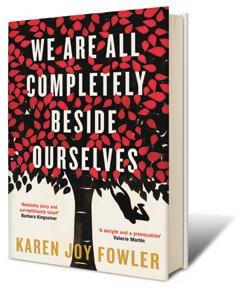
This is an extremely tricky book to review. Not for the usual reasons— because it’s difficult to read (it isn’t); or because it’s hard to tell whether it’s any good or not (it’s very good indeed). No, the problem is that a quarter of the way through, there’s a jaw-dropping twist that shapes the rest of the novel. If I don’t reveal it, I can’t possibly explain how and why the whole thing works so beautifully. If I do, I’ll not only deprive you of a thrillingly timed surprise. I’ll also undermine Karen Joy Fowler’s entirely justified reasons for placing it where she does.
In the circumstances, I can only tell you that pretwist, the book seems like a wonderfully sharp picture of a disintegrating American family, narrated in an easy conversational style. Post-twist, it still does—but, in addition, becomes nothing less than a full-on exploration of what makes human beings human.
And that, I’m afraid, is all I’m prepared to say for now, apart from a confident prediction that—like
BY JAMES WALTONJames Walton writes and presents the BBC
Radio 4 literary quiz
The Write Stuff

?name the author Answer on page 132
Can you guess the writer from these clues (and, of course, the fewer you need the better).
1. Aged 18, and already a published poet, he was expelled from Oxford for writing an atheist pamphlet.
2. He drowned in 1822, shortly before his 30th birthday.
3. His second wife wrote one of the most famous of all horror stories.
Fowler’s 2004 novel The Jane Austen Book Club—the result will be a big hit; and that when it is, its secret won’t stay secret for long. In other words, the sooner you read it, the better.
by Lorrie Moore (Faber, £16.99; ebook, £11.05)
In the modern books world, there aren’t many things rarer than a bestselling short-story writer—but Lorrie Moore has deserved every bit of her success. In her first new collection for 15 years, the main characters have inevitably grown older, with many either caught in long-term marriages (“What had happened to the handsome hippie she had married?”) or dealing with the gruesome business of post-divorce dating (“picking up where they had left off decades ago, if only they could remember where the hell that was”).
Once again, though, Moore plunges us deep and instantly into their lives, while also conveying with miraculous concision the choices, mistakes and accidents that have led them to this point. She’s as funny as ever too—combining sympathy and beady-eyed shrewdness with quietly zinging one-liners. In the first story, for example, a child of divorce is “now rudely transported between houses in a speedy, ritualistic manner resembling a hostage drop-off”.
March
The People’s Songs: the Story of Modern Britain in 50 Records by Stuart Maconie (Ebury, £8.99). In a book that accompanied the acclaimed radio series, our own music critic proves as good on the social history as he is on the music that both shaped and reflected it. Packed with the kind of facts you’ll want to tell your friends about.
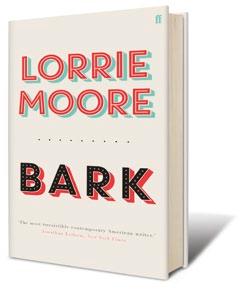
Burial Rites by Hannah Kent (Picador, £7.99). First novel about a real-life murder in 19th-century Iceland—and far more beguiling than that may make it sound.
The Reason I Jump by Naoki Higashida (Sceptre, £7.99). Enormously affecting and maybe even important non-fiction in which an autistic boy describes his world. The Quarry by Iain Banks (Abacus, £7.99). His final novel featuring a character with terminal cancer—even though it was mostly written before he was diagnosed with the disease himself.
Short stories, like vinyl records, are often predicted to be on the brink of a comeback that somehow never quite happens. Nonetheless, if you want to see how terrific—and satisfying—they can be, then Lorrie Moore on the top of her form is a pretty good place to start.

This Boy by Alan Johnson (Corgi, £7.99). Eyeopening memoir by the ex-government minister (left) of growing up poor in the London of the 1950s and 60s. Already considered something of a classic.
►
A daughter’s memories of her parents’ deaths don’t always make for a comfortable read—but they do provide an extremely powerful one

In 1992, when Claire Bidwell Smith was 14, both her parents were diagnosed with cancer in the same month. After an operation, her mother initially rallied. But she then spent the next few years in and out of hospital before dying in early 1997. (On the first anniversary of her mother’s death, Claire wrote her a brief letter reading, “Dear Mom, I don’t know how to be without you. Please come back.”) Her father followed six years later, leaving Claire—an only child—an orphan at 25. And from that, you might expect either an archetypal American misery memoir or a rather pious commemoration of her late parents. In both cases, though, you’d be wrong—because, as Claire chronicles her life from those initial diagnoses to the present day, The Rules of Inheritance is marked at every point by the unsparing, and at times almost uncomfortable, level of its honesty.
Claire describes her adolescent self as “a little weird in that disgruntled-suburban-teen-girl kind of way”—and from there her commitment to candour never falters. In the course of the book, she admits to any amount of rackety behaviour. (To her lasting horror, she even missed her mother’s death because she broke the long drive from her college in Vermont to the hospital in Washington by staying overnight at the house of a guy she fancied.) She also acknowledges all sorts of ignoble— if understandable—feelings that the rest of us might well have kept quiet about. The result is an impressively brave book that, if it doesn’t always make the author seem likeable, does make her totally believable.
Admittedly, the fact that the chapters aren’t in chronological order does mean readers need to keep their wits about them to piece together the whole story—but this is for a reason. Now a
And When Did You Last See Your Father? by Blake Morrison (1993) A brilliantly rounded portrait of Morrison’s irascible and much-loved dad, a Yorkshire doctor.
Family Romance by John Lanchester (2007) After his mother’s death, Lanchester discovered that she was nine years older than she’d always claimed. With his usual sympathy and intelligence, one of our finest novelists unearths her secrets and considers the emotional price she must have paid for keeping them.
Once in a House on Fire by Andrea Ashworth (1998)
“My fear of our house made everything else a breeze,” declares
five more great memoirs of parents ►


grief counsellor (and mother) herself, Claire wants to show that the five stages of grief are by no means orderly themselves. Instead, they overlap, flip back and forth and reappear when you least expect them.
The book is now being made into a film starring Jennifer Lawrence—although it remains to be seen whether Hollywood will be able to resist softening the edges in a way Claire never does. In the meantime, here’s a characteristic passage from 1996, with her mother Sally in hospital, entering the final stages of her illness:
My mother was once a very beautiful woman, statuesque with a perfect sheath of white-blonde hair that fell to her shoulders. She turned men’s heads well into her fifties. But now her skin is grey, her cheeks sunken and sagging, and tubes snake their way from her nose, disappearing into the sheets. The skin hangs on her arms like threadbare towels on a laundry line.
I sit in her room for hours at a time, leaning back in my chair, careful not to disturb the colostomy bag. There is a tennis match on the television. My mother watches with limp concentration, her mouth open, her lips dry and cracked. She used to be fanatical about tennis. Every summer her arms grew stronger and more bronzed by the month. At night she would complain about her backhand, going over the details of the day’s match at the country club.
Held safe: Claire as a baby with her mum Sally—and as a girl with both parents
The Rules of Inheritance: a Memoir by Claire Bidwell Smith is published by Headline on March 13 at £13.99; ebook, £6.99 ‘‘
My aunt Pam comes in, breaking my reverie. She is my mother’s younger sister. Their relationship has always been a
►

I am afraid to touch her.
I miss her beauty, miss her tanned, fit form. I don’t like her scaly feet. Thiscreatureis notmymother.
complicated one, fuelled by competition, but for now they seem to have put that aside.
My mother smiles weakly at her.
Sally, Pam says with a bright smile. She treats my mother as though nothing has changed, and I am both jealous and resentful of this ability.
Oh, you’re so dry, honey, she says. Let’s get you all fixed up.
Pam grabs a tube of Vaseline and rubs a smear across my mother’s lips. My mother presses her lips together, musters another smile.
Let’s see these feet, Pam says, pulling back the sheet. Oh, I bet we can do better with these too.
She grabs a bottle of lotion and begins to gently rub my mother’s feet.
I watch all this silently from my chair. I wish I could do these things for her. But I can’t. The truth is that my mother’s body disgusts me. The truth is that I am terrified of it.
I can’t shake the idea that she is rotting from the inside out, like a piece of fruit. I am afraid to touch her. I miss her beauty, miss her tanned, fit form. I don’t like her cracked lips or her scaly feet. This creature is not my mother.
Later a nurse comes to bathe her. She helps my mother out of bed, spreads a towel over the floor for my mother to stand on. The nurse unties my mother’s hospital gown, tosses it into a corner.
My mother is naked, her form hunched over, her skin loose. I can see the bones in her spine, bumping down her back. She looks over.
This is where we live, Claire.
I don’t know what she means. I become perfectly still, trying to will this moment from happening.
I want to go home, but I don’t know where that is anymore.
I want my mother back, but I know that she is already gone. I don’t want to remember any of this, but I know that I will.

and the name of the author is… Percy Bysshe Shelley (whose wife Mary wrote Frankenstein when she was 20).
Ashworth in her award-winning book about how two gruesome stepfathers mistreated her mother, and herself.
Dreams from My Father by Barak Obama (1995)
Published long before the world had heard of him, Obama’s memoir of his largely absent father is good enough to suggest that, if he hadn’t been unfortunately sidetracked, the man could have had a literary career.
Mommie Dearest by Christina Crawford (1978)

Joan Crawford’s adopted daughter (above with Mommie) writes one of the first tell-all Hollywood books. Even now, it remains hair-raising and guiltily irresistible.

Alexander McCall Smith is a best-selling author around the world, and has been translated into more than 40 languages. The Minor Adjustment Beauty Salon—the latest book in the much-loved The No 1 Ladies Detective Agency series—has just been published in paperback. His new book The Forever Girl is out in hardback.
When I was five years old this funny little blue book was more precious to me than anything. I read it and read it, looking at the drawings of ships and studying their tonnage and speeds with joy. I slept with it under my pillow. I was so proud to be its owner and I became a very keen reader. It gave rise to my lifelong love of books. Obviously there wasn’t a ship in sight in land-locked Rhodesia— now Zimbabwe—where I was growing up, but that didn’t matter. I loved it.
I still remember the moment I took this off the shelf in the library of Queen’s University Belfast, where I was teaching in the early 1970s. What a discovery it was; the start of the greatest literary enthusiasm of my life. Auden uses language so beautifully and explores so many ideas that I felt he was talking directly to me—a marvellous sensation which has never diminished. I’ve learned many lessons from his sympathetic understanding of the world and I carry this collection around with me always. I hope my recent book What W H Auden Can Do for You will encourage appreciation of the man I think is the most engaging poet of the 20th century.
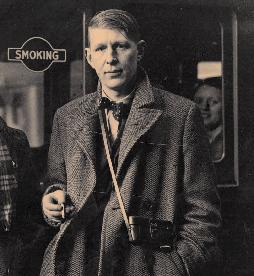

I picked this up by chance around 30 years ago and was immediately won over by its insight into architecture, planning and the spaces around us. It explains why we feel comfortable in one place but not in another. I’ve been aware of, and sensitive to, my environment ever since. Whenever I look at buildings or enter a room I think, What would Christopher Alexander say about this? You can apply his humane principles to any man-made setting, even your own living room. The book really did change the way I look at the world. In fact, I’m going to pen him a letter right now and let him know just that. ■
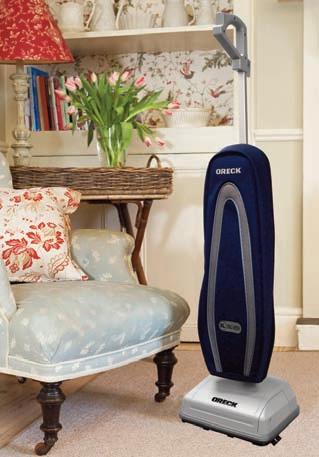









win £50 for every reader’s joke we publish. Visit readersdigest.co.uk/ contact-us or facebook.com/readersdigestuk
¶ Earth is visited by aliens, and they turn out to be really friendly. The leaders of the world and the aliens stage a televised event where they can ask each other any questions they want.
During this event, the Pope talks to the alien leader. “I was wondering if you know about Jesus Christ?” he asks.
“How could we not!” exclaims the alien leader. “He visits our planet every two years or so. Awesome guy!”
“Every two years!?” says the Pope angrily. “We’re still waiting for his second coming!”
Trying to calm him down, the alien leader says, “Maybe he didn’t like your chocolate.”
“What does chocolate have to do with this?” asks the Pope, still angry.
“Well, when he visits our planet, we give him huge boxes of chocolate,” the alien leader replies. “Why, what did you guys do when he was here?” Seen at Reddit.com
¶ My retired friend was walking back home from the pub at 1am when the police stopped him and asked, “Where were you between five and 11?”
“Primary school,” he said. Tony Blades, the Wirral

¶ A mArried couple were in A shopping centre. The whole place was packed, and as the wife walked through the centre she was surprised to find that when she looked around her husband was nowhere to be seen.
She was quite upset because they had a lot to do, so she called him on her mobile to ask him where he was.
Her husband answered his phone and said, “Do you remember the jeweller’s we went to about five years ago where you fell in love with that diamond necklace that we couldn’t afford, and I told you that one day I’d get it for you?”
The wife choked up and started to cry. “Yes, I do remember that shop,” she said.
“Well, I’m in the pub next door,” he replied. Grahame Jones, London
¶ There are times when I ask myself why I’m throwing my life away.
But then I cheer myself up by watching funny cat videos on the internet.
Seen at 9GAG.com
¶ Fred Sanger died last year. He was described as “the father of DNA testing”. But was he the real father?
If only there was a way to check…
¶ The town miser was on his deathbed. As his last request, he asked to be alone with his lawyer, doctor and priest.
“I know I’m going to die,” he said, “and I’d like to take my money with me. So I’m going to give each of you £150,000 and I want you all to make sure the money is put in the coffin.”
It was a few days after the funeral when the priest, wracked with guilt, finally confided to the other two that he had only given £100,000 back.
“I’m glad you brought it up,” said the doctor, “because I’ve also been feeling guilty—I only put £80,000 in the coffin.”
“You two should be ashamed of yourselves!” stormed the lawyer. “Am I the only honest person here?”
He pulled out his cheque book. “Here, look! I wrote out a cheque for the full £150,000!” Seen on the internet
I work in McDonald’s and a customer was rude to me today, so I got my own back by not putting any Coke in his drink. Just ice was served.
Andrew Berry, Lincoln
Model
the good thing about lending someone your time machine is you basically get it back immediately
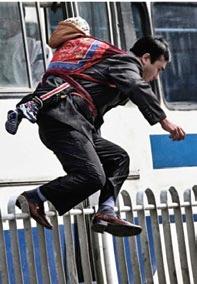



Everyone likes a good pun, but none more so than the self-styled Punning Man (aka Sean Leahy), who’s posted numerous examples at thepunningman.tumblr.com: pundon calling!










¶ Ten years ago, I named all my snooker gear after school subjects. The rest is history.
Daniel Edison, Hampshire
¶ I’m so shocked and upset to hear the news about Celine Dion.
She has a new single out.
Comedian Peter Serafinowicz
¶ I’ve spent the last few months trying to find my biological father. My mum said I shouldn’t bother— according to her, he was a complete scumbag who only cared about making himself look good and nothing else.
So imagine my surprise when I called Jeremy Kyle and he welcomed me with open arms.
I’m even thinking of changing my surname to Kyle now. Seen on the internet
ladies and gentlemen, please welcome John robins
favourite one-liner?
Mangoes in a fruit shop
(Man goes in a fruit shop)
what’s the best gig you’ve ever done?
There’s an event in Bristol called Comedy Garden, which is basically a big outdoor tent that holds about 700 people. That was great fun—it was nice to go back to the town where I used to perform on a Sunday night for free in front of eight people in the back of a pub. The tent was literally 200 yards from there.

what’s your best heckler experience?
I did an open-mic gig in a proper old man’s pub in Cardiff, and there was a girl I quite fancied in the front row. I can’t remember how it came up, but at one point she said I looked like Brad Pitt. I was really pleased with myself, but then this guy from the bar shouted out, “Brad Pitt? Armpit, more like!”
funniest thing that’s ever happened to you? I once accidentally drank [fellow comedian] Reginald D Hunter’s urine backstage at a gig. He’d taken a wee in an empty pint glass—it looked like a pint of shandy.
favourite tv show?
Bottom is the main one for me. The story goes that Rik Mayall and Adrian Edmondson were performing in Waiting for Godot and thought, Why don’t we set this in a flat with two really mad guys?

¶ Nowadays, the early bird texts the worm to say he’s running late.
Comedian Paul Foot
finally, who’s your coMedy inspiration?
I’d say it’s 50 per cent Alan Partridge and 50 cent my mates down the pub. I also lived with Russell Howard and Jon Richardson for a year in Bristol, and they played a big part in shaping my comedy persona. n
Grab a cup of tea and a biscuit and bend your mind to these puzzles, ranging from the mildly puzzling to the pen-chewingly fiendish
You’re asked to mend a hole in a floor exactly 20cm wide and 120cm long. All you have available is a board 30cm wide and 80cm long. How can you carry out the task by making just one cut to divide the board into two pieces? The hole must be entirely covered, no two parts of the board should overlap and the board shouldn’t overlap the edge of the hole.
just say yes or no
Don’t think too hard: trust your instincts and see how many of the questions below you get right:
1) Are these red lines all the same length?
2) Were all of these Olympic years?
1980 1908
1936 1930
3) Are these numbers all divisible by 3?

sudoku To win, you have to put a number from 1 to 9 in each outlined section so that: • every horizontal row and vertical column contains all nine numerals (1–9) without repeating any of them • each of the outlined sections has all nine numerals, none repeated. If you want even more of a challenge, try timing yourself too. difficulty HH
pick a number Can you work out what number is missing from the bottom row?
* Entry is open only to residents of the UK, Channel Islands, Isle of Man and Republic of Ireland aged 18 or over. It is not open to employees of Vivat Direct Limited (t/a Reader’s Digest), its subsidiary companies and all other persons associated with the competition.
number of the first shape to the second number of the second shape; hence 9 + 5 = 14 and 7 + 6 = 13 (1413).
number of the second shape, then add the first
the second number of the first shape to the first
ickp a number: 1413. The sequence is to add
solved it within: 15 minutes, you’re a true expert; 30 minutes, you’re no slouch either; 60 minutes or more, maybe numbers aren’t your thing. FOR MORE
udoku:s If you

3) Yes, all divisible by 3.
1) Yes, the same length. 2) No, 1930 wasn’t.
ustj say yes or no:
Then lay pieces A and B side by side as below: A
£50 prize question
(answer published in the april issue)
What shape should be in the middle? this needs a bit of lateral thinking…
hickt as a plank: Cut the board as shown:
The first correct answer we pick on February 28 wins £50!* Email excerpts@readersdigest.co.uk
One apple weighs as much as three cherries; and two bananas weigh as much as five cherries. Thus, 4 bananas are needed to balance scale C. answer to February’s prize question:
and the £50 goes to…
Marylin Kilsby from London


More and more people are planning their funeral in advance ensuring loved ones are protected from rising funeral costs.
The average cost of a funeral has increased above inflation and average savings rates in recent years. So even those who think they have adequate savings could end up leaving a shortfall for their loved ones to pay. In 2006 the average cost of a funeral was £2,225 and by 2013 this had risen to £3,594; if costs continue to increase at this rate, a funeral could reach almost £5,000 by 2018*. By choosing to take out a Guaranteed Funeral Plan with Dignity, the UK’s leading funeral plan provider, you pay for the funeral in advance,
fixing the cost at today’s prices, rather than relying on savings or life insurance policies. So regardless of how much funeral costs rise in the years ahead, you are ensuring that your loved ones will not have to find funds to pay for the funeral at the same time as having to cope with the emotional distress of losing a loved one.
A Guaranteed Funeral Plan also lets you take care of funeral arrangements in advance, which means you can rest assured that your funeral will go ahead exactly as you wanted. This is better than leaving your funeral wishes in a Will because in most cases it isn’t read until after the funeral.

Dignity is the UK’s leading provider of funeral plans, and has already helped more than 590,000 people arrange their funeral in advance. With a national network of more than 1,100 owned or approved funeral directors, they conduct more than 63,000 funerals each year, so you can be sure that your funeral will be in safe hands. You can also be confident your money is safe. All monies for the Plan are paid into the National Funeral Trust – a totally independent Trust Fund to make sure that every Funeral Plan members’ money is properly protected.

*The average cost of a funeral has risen from £1,580 in 2000 to £2,225 in 2006 (source: Mintel Funerals /UK /January 2007) to £3,594 in 2013, (source: Matter Communications 2012). Based on an average increase of 6.53% each year between 2000 and 2013, Dignity estimates that by 2018 the average cost of a funeral will be £4,931.
photograph posed by models to protect customer privacyw I n £100 and a Ca rtoon pr I nt

Think of a witty caption for this picture and you could beat the experts at their own game. The three best suggestions will be posted on our website in mid-March alongside an anonymous caption from our professional cartoonist. Visitors can choose their favourite— and if your entry gets the most votes, you’ll receive £100 and a framed copy of the drawing. Submit to captions@readersdigest.co.uk or readersdigest.co.uk/caption by March 7. Vote online at readersdigest.co.uk/caption. We’ll announce the winner in our May issue. n

The readers win again! Holly Murphy’s suggestion, “She doesn’t get out of her bed for less than £10,000,” attracted seven times as many votes as cartoonist Len Hawkins’s caption, “Making a documentary about a week in the life of a cat has proved to be less challenging than I anticipated.” The heat is on…
scoreboard readers 18 cartoonists 7

Lost in tHe atL antic
PLus new research on why our senses influence our behaviour without us even knowing irvine welsh on football, class and falling in love
facebook.com/readersdigestuk

Give your home the red carpet treatment!
professional uprights have been world leaders for many years due to their outstanding German build quality, design excellence and superb performance.
domestic vacuum cleaners are built to the same high standards: That is why they routinely come top in reliability and customer satisfaction surveys and that is why, when you use one, your home will not SEBO clean.


SEBO – the vacuum cleaner professionals
For a chance to win a SEBO vacuum cleaner, enter our monthly draw at: www.sebo.co.uk
www.sebo.co.uk
01494
465533


